#(re)discovering a strange new spock
Text
(Re)Discovering A Strange New Spock: “The Menagerie” (1x11, 1x12)
Previous: The Corbomite Maneuver
Next: The Conscience of A King
A meta anthology where I re-examine TOS, especially Spock, in light of the new information Discovery & Strange New Worlds has revealed about him to us.
Hoooooo BOY! This one is gonna be an absolute DOOZY. If any episode(s) from TOS were drastically recontextualized by the events of Discovery & Strange New Worlds it’s this particular pair.
I actually had a bit of an older piece of meta discussing theories about this episode after having rewatched The Cage, If Memory Serves, Through The Valley of Shadows, A Quality of Mercy and then these two if anybody wants to see the homework I did on this episode in particular. Tl:dr a lot of the footnotes/theories from that will be in here in a bit more polished and elaborated of a format.
Brace yourselves, this’ll be a long one! Onto the analysis!
Captain Pike’s Condition
There’s a few things that we can glean from the opener of this episode that I think people tend to forget when Chris’s condition gets addressed in a meta narrative way.
It’s a lot more than him being wheelchair bound and in need of a speech aid.
Chris has been in intensive care for months, when he’s taken to the Enterprise he needs 24/7 medical supervision. Any serious emotional upset could potentially put him in a coma. He’s canonically inplied to be in a lot of pain and is easily exhausted. The chair is confirmed to be life support and the only thing between him and his DNA unraveling to a terminal degree. Hence it’s limited capacity for mobility and as a speech aid, the device is prioritizing other things.
He survived severe exposure to delta radiation where two cadets in the same room died. Something I theorize may have to do with Una considering how she spared herself and La’an from warp core radiation, the chimeric antibodies still being in La’an afterward. If Una did something similar for Chris it may have been the difference between death and a very difficult but endurable life.
What Spock is trying to offer Chris is a chance at drastically improving his quality of life. “There’s surviving, and then there’s living.” Talos IV isn’t exile. It’s pain killers, it’s better mobility and speech aids than what Starfleet medicine can currently provide. Chronic medical problems can make leaving your house, or a planet, difficult. Chris being able to thrive on Talos IV whatever way he chooses. with various means of making life more livable. While leaving the planet being difficult to achieve beyond the planet’s confines isn’t all that different.
However indelicate and dramatic Spock’s attempt at helping Chris may be, I don’t think it’s out of some sort of unnuanced ableism.
Two Lights Means “No.”
When the triumvirate arrives, Pike dismisses Kirk & McCoy but allows Spock to stay. Which is no surprise given their relationship.
What does intrigue me however is “You know why I’ve come Captain.”
It implies that Spock had intentions to take Pike to Talos IV prior to the incident. Which makes sense considering Spock had the same foreknowledge as Chris has, if not as directly. Not only that but Spock made a game plan and Pike knows about it.
I also keep thinking about how Pike ends up in a medical facility on Starbase 11 of all places. The one space station that just so happens to be the closest to Talos IV. Which is something that Spock couldn’t have controlled, but Chris potentially could have. Which leads me to the following theory:
If Memory Serves is not the last time we will see Talos IV, I think it will be visited or at least discussed again in SNW. That plans may even be made between Spock & Pike about getting Pike there after the accident somehow. Then something unforeseen either pushing the time table forward (as in while Spock is still serving on Enterprise) or farther back (as in not immediately after the accident).
When Pike cuts him off by refusing, Spock’s response isn’t “I know you don’t want to go but logically blah blah blah”
It’s acknowledging he will be putting himself, his career, and his relationship with Jim at serious risk by doing this for Chris.
Knowing what we already do about Pike, he’s continuing to put the well-being of others above his own. Even when “well” is an extremely strong word for how he’s doing. Pike doesn’t want to risk the reason he allowed this to happen to him getting sabotaged because Spock wants to do something for his sake.
Unfortunately however, Pike taught his boy a little too well. It’s time for Spock to return a small amount of the kindness Pike showed him. With all the compassion of a Human being, and all the stubbornness of Vulcankind.
Kirk’s Faith in Spock, McCoy’s Thoughts on Spock in Private
Up until the evidence begins to weigh Jim down is incredibly defensive of Spock. Bordering on denial at the notion that he would ever be capable of betraying him, only in private to McCoy does he confide his budding doubts.
What does McCoy do in this situation? Defend Spock! He sees him how many people (especially people who have affection for him) see him, operating under the assumption that he Vulcans are honest. Which is hilarious when you consider Spock is the biggest liar between the three of them.
He then goes on to confirm what I knew he knew about Spock from the get go. McCoy is acutely aware of Spock’s utter loathing and rejection of his human side. He even admits to being more emotional and going off half-cocked, but believes Spock incapable of it.
Honestly I think McCoy will find himself liking and being annoyed by Spock in equal measure a lot more. After how he is proved right (Spock us as vulnerable to emotions like love and sentimentality as the rest of us) and proved wrong (Spock’s a liar and even a loose canon) in this episode.
Is This The Real Life? Or Is It Just Fantasy?
Spock seemingly managing to hardwire the ship to kill everyone if they undo the autopilot to Talos IV. It just doesn’t seem like a very Spock thing to do even under these circumstances where he allows the needs of the one to outweigh the many.
The entire fake-out court martial was done as a test for Kirk. However Spock does seem greatly taken aback at the idea of Kirk being punished for his actions as well. Which implies that either Spock is a very good actor, or didn’t know the Commodore was an illusion either. Which could mean that the Talosians were testing both Kirk & Spock for reasons unknown. Unless!
Spock and the Talosians share the same goal, to test Kirk’s faith. In this case, Spock is testing whether Jim’s career is more important to him than Spock or the truth. “Jim, don’t stop me, don’t let him stop me.” Which it is, but an element of trust has been broken between them, something I think takes a couple episodes to fully heal.
Pike In The Courtroom
I find the shift in Pike’s attitude from getting taken aboard to Spock’s fake court martial is intriguing. I wonder how much Pike knows of Spock’s plan and whether or not he can tell the Commodore is a Talosian illusion.
Regardless, he wants the one person who is real in that court room to see what happened to him and to Spock in “The Cage” even as the Talosian sock puppet plays devil’s advocate, very interesting indeed.
Then, when the Talosians remove the vision momentarily, Pike is the first to vote Spock as guilty. Yet allows the record of what happened to him to finish. Maybe as if to see what Kirk will do when faced with an otherwise unanimous choice.
Maybe it was also one last dig at Spock for defying orders. This further implies Pike knew the plan because I highly doubt he’d condemn Spock to death like that on the fly. Not after everything else they’d been through or why they were headed to Talos in the first place.
Then, when the chips are down, even after there are no consequences to Chris saying “no”. No punishment for Spock, and Jim finally understands what’s going on. Pike says “yes” when asked if he wants to go to Talos IV, and thanks Kirk through Spock before Spock leads him away.
Pike has finally let someone else do something compassionate for him instead of the other way around. Taking the advice that he so often gives others which frequently boils down to “let other people trust and be kind to you.” One, final assurance that Spock will be just fine as he moves on to other things. Speaking of which!
Pike Is Still Active Duty (Life Post-Talos)
The Talosians test Kirk, maybe Spock as well, the Commodore is an illusion and Spock (anc possibly Pike) knows that. Pike wants Kirk to see the whole story behind the Talosians. The Talosians want Pike alive and care about both him and Spock’s want.
Yet they’ve conceded to the inevitability of their extinction. Vina is no longer a prisoner. She has chosen to stay and act as a liason to the rare visitor as we see in If Memory Serves. Spock keeps insisting that it’s more complicated than it looks. He confirms they want Pike alive but denies that they want him as a zoo specimen.
And Pike is still an active duty officer and ranking Fleet Captain. The court martial never happened, and General Order 7 is waived for Pike & Spock specifically. Pike has explicit permission to go, and Spock’s charges are dropped.
To me this indicates that the Talosians need Pike for something, something other captive entertainment. As we know, the Talosians don’t seem to particularly enjoy doing things for free, and I’m sure they got their fill from the court drama they imposed on Kirk. Was that really enough?
I think the Talosians may need a Starfleet officer whose already familiar with them and their plights, maybe old, maybe new dangers to them. Spock’s got too many other obligations and Una isn’t present. Which leaves Chris, who has the most to gain from that arrangement.
I would like to think (and maybe it’ll be true) Chris’s career continues covertly as a liason between Talos IV and Starbase 11, continuing his career from a ground posting. If not, the guy deserves a nice retirement after how much he’s already given to the Federation.
Closing Banter w/ The Talosians
After letting Spock see Pike off to Talos IV, the Talosians make an interesting decision as Kirk stares wistfully in Spock’s direction as he leaves.
They show him Vina leaving in her romantic “happily ever after” with her illusory version of Pike. (There’s no way it was real Pike at this point lol, Pike & Spock couldn’t have made it to the transporter room that fast).
“You have your reality, may you find your way as pleasant.”
Man, if we know anything about the Talosians it’s that they love piping hot tea. Even if Spock & Kirk can’t see quite how deeply they care for one another, the Talosians certainly can.
#(re)discovering a strange new spock#star trek#star trek tos#star trek strange new worlds#star trek discovery#tos 1x11#tos 1x12#the menagerie#if memory serves#the cage#Star Trek Vina#Spock#s’chn t’gai spock#captain christopher pike#captain James kirk#Jim kirk#spirk#k/s#dr leonard mccoy#leonard bones mccoy#Talos iv#Talosians#Star Trek meta#meta analysis#character meta#cw long post#long post#lar trek
98 notes
·
View notes
Text
Storytelling and Character Development in Those Old Scientists
As the show that isn’t strictly serialized but also doesn’t have a hard reset button, the Strange New Worlds writers really impressed me with their genre savvy in so many ways with “Those Old Scientists.”
Several characters have very meaningful, not just silly interactions with Boimler and Mariner. The jokes were overwhelmingly good and the SNW crew were funny without acting outrageously out of character.
Except for Spock.
And that’s the part I think is brilliant. We’ve got another silly episode to go before we find out if this is a lasting thing or not, but if Spock experimenting with expressing his emotions is going to be a thing going forward, then SNW deftly anticipated how uncomfortable this was going to make fans and they leaned into it!
Starting this arc, if an arc it’s meant to be, in the midst of a comedy episode threw open the door to telegraphing to the audience what the appropriate reaction was. Which is cringe. Deliberately so. Spock is bad at this. Extremely bad at this. It’s okay to be uncomfortable. That’s what they’re aiming for.
Boimler’s future knowledge about Spock is another meta way of assuring the canon hawks once again that while the Prime timeline is messy at the level of detail, no one intends to screw with the fundamentals. Spock’s flirtation with expressing emotions is a phase.
However, I don’t think it’s just a bit. I don’t think anything in this episode was only for comedy. This episode is a lot like the character of Mariner herself. If you only pay attention to the funny, you’re missing what’s really going on.
Una gets a nice bit of reassurance that eventually she’s not going to represent a shameful episode in Starfleet history where it discovers a closeted “freak” in their midst, eventually her words and image are considered so powerful they’re recruiting poster material.
Pike also gets a vision of his afterlife. The clock is ticking but he’s on the right track and making the most of the time he has left.
Chapel and Spock get some seeds of doubt planted in them.
Uhura is encouraged to take better care of herself as the key to becoming the all star she now knows is her professional legacy. To become a more well rounded person.
Which brings us back to Spock.
The interesting thing about Spock and Boimler’s interaction is that I think Boimler is completely wrong. Not in a bad way, but like any student of history, he’s got caught up in the myth making.
Clearly the version of Spock he became invested in de-emphasized his decision to turn away from purging his emotions. The Spock we see from that point forward clearly feels emotion, he’s just not ruled by it. That Spock is so completely comfortable in his skin in a way that few humans or Vulcans ever seem to be.
My read on this is that post-Star Trek TMP, Spock has amicably reconciled his twin natures and has found a way to quietly permit himself emotion, and even to let a little out in a way that is designed to help his close colleagues read him better. Yet he also retains the immense discipline.
This is the path that I believe Ethan Peck’s Spock is on. His Spock will struggle to find an equilibrium until re establishing the sort of inner peace that can permit him to push forward a little emotion now and then to playfully gaslight McCoy and then deny everything as part of their eternal fencing.
#star trek#storytelling#strange new worlds spoilers#those old scientists#snw spock#mister spock#spock#brad boimler#ensign mariner#logic#emotion#balance#SNW s2e7
37 notes
·
View notes
Photo
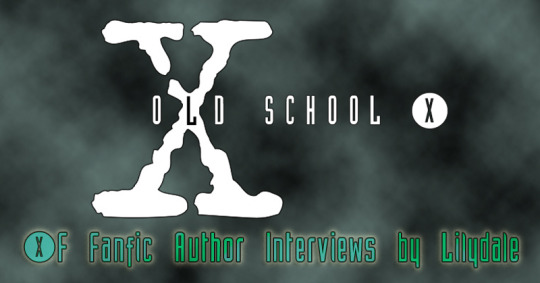
Old School X is a project interviewing X-Files fanfic authors who were posting fic during the original run of the show. New interviews are posted every Tuesday.
Interview with MaybeAmanda
MaybeAmanda has been a longtime participant in X-files fandom. She has 29 stories at Gossamer, the earliest being archived there in 1998 and the latest in 2012. I've recced some of my favorites of her stories here before, including "Malus Genus" and "Snow in Alabama." Big thanks to MaybeAmanda for doing this interview.
Does it surprise you that people are still interested in reading your X-Files fanfics and others that were posted during the original run of the show (1993-2002)?
It does, in a way. The feedback I get nowadays is either of the "I read this like 20 years ago and I just read it again" variety or the "I was too young back in the day but I have been watching the show in reruns/on XYZ streaming service/on the full-series of DVDs I got for $3 from the thrift store and I was THRILLED to discover fanfiction was being written even in the Dark Ages!" So it's a bit of a surprise, but it's a pleasant one. I answer every mail/comment because my mama raised me right!
What do you think of when you think about your X-Files fandom experience? What did you take away from it?
It was great. It was fun. It was educational. It was a godsend. Even with the occasional bouts of back-stabbing and flame-throwing, it was mainly a welcoming, inclusive place to be. I made so many online friends who have turned into meat-friends (do they still call them that? Probably not). During the first run of the show I had small children and we had relocated for my husband's job. I had very little social life, but the fandom gave me a chance to meet and connect with people who liked what I liked. Then I discovered online fanfic, and it was even better!
Social media didn't really exist during the show's original run. How were you most involved with the X-Files online (atxc, message board, email mailing list, etc.)?
ATXC I think. A lot of email lists - 5 or 6 or 7 or so over the years. Gossamer, of course, Ephemeral when that came into being. Haven discussion boards. My own websites.
What did you take away from your experience with X-Files fic or with the fandom in general?
More than anything? I am a fangirl.
What was it that got you hooked on the X-Files as a show?
I have always been partial to sci-fi and speculative fiction, but it rarely makes it to the screen - large or small - without being trite, clichéd, or just plain bad. It's easy to forget that The X-Files was groundbreaking - smart, scary, funny, insightful, intriguing, complex plots, on-going mythology. It looked great. It sounded great. David Duchovny was pleasant to look at, too, and damn! Gillian Anderson is/was one hell of an actress.
What got you involved with X-Files fanfic?
I found XF fanfic - somehow - probably by accident, or by way of a recommendation - and it blew my mind. I had written fanfic (of a sort) with my friends in highschool, so I was familiar with the beast, but to find what amounted to excellent story after excellent story for free within (relatively) easy reach (because dial-up, right?) written by people who, for the most part, were thrilled you read their story and were happy to talk to you about it, about writing in general, about your shared obsession - that was amazing. As I am sitting here typing this I am feeling that thrill again - discovering Karen Rasch, Madeliene Partous, Paula Graves [Lilydale note: AKA Anne Haynes], Sheryl Martin and all the other early BNFs was, well, the only word is exciting. I felt like I was a member of a secret society and that I was sitting at the popular kids lunch table, all at once. (Don't forget, in the early days, shippers were considered delusional outliers - seriously!)
What is your relationship like now to X-Files fandom?
Good? It's not as lively a place as it once was, but I haven't renounced my citizenship or anything. If I get a rec, I check it out. I know there are those who like to pretend they never had anything to do with the fandom, but why? I am still a proud XPhile.
Were you involved with any fandoms after the X-Files? If so, what was it like compared to X-Files?
Angel (a teeny tiny bit) while XF was still running, but those fans were - I don't know the word. Hardcore does not begin to do it justice. I wrote two short pieces at a friend's request then backed away slowly. Sherlock (a bit) - it is/was very LJ centred and that made it hard to find things. A lot of it moved to tumblr which made it harder, then to twitter, which - no. I was involved in one of the less fashionable facets of the Sherlock fandom, so I was really a fringe-dweller there, too. It seemed clique-ier than XF, and they all seemed so young, and they all knew EVERYTHING about everything, and every damned thing was political, and, and, and... GET OFF MY LAWN!
But maybe I am remembering the XF fandom wrong. ;)
Who are some of your favorite fictional characters? Why?
Like, all fiction? Mulder and Scully for sure. Arthur Dent. Sherlock Holmes in most of his incarnations. Spock. Winnie the Pooh. Why do I like them? They speak to me, I guess.
Do you ever still watch The X-Files or think about Mulder and Scully?
I haven't watched an episode in probably two years (back when it was on regular tv). Yeah, I think about them surprisingly often. Story ideas, weirdly.
Do you ever still read X-Files fic?
I finished re-reading The Iolokus Series a couple of weeks back, so yes. It's excellent comfort reading.
Do you have any favorite X-Files fanfic stories or authors?
Lots! But as far as authors go, I hate playing favourites. I will miss someone I shouldn't and feel like crap. The Iolokus Series by MustangSally and Rivka T. is probably my all-time favourite fic because it's so very well-written, and so very fucked-up. Kipler's Strangers and the Strange Dead is also terrifically well-written and clever. For complex, interesting case files, you can’t beat syntax6 - pick any of them.
What is your favorite of your own fics, X-Files and/or otherwise?
Oh geez. Seriously? I wrote a lot of collaborations and I love them - and my co-authors - all! Stuff I wrote on my own: Anniversary Waltz (first XF fic I wrote so it's sentimental.) Or Blue Patches. Or Epiphany. Or The Gifts of the Magi (On a Kaiser Roll). Or 221XF. Gonna stop now.
Do you think you'll ever write another X-Files story?
Every time I thought I wouldn't, I did. I would never say never.
Or dust off and post an oldie that for whatever reason never made it online?
Nothing finished ever went un-posted. All the unfinished stuff remains unfinished.
Do you still write fic now?
Haven't for a while, but it's not as if I have said "I SHALL NEVER WRITE FANFIC AGAIN!" I just have nothing in the works at this moment.
Where do you get ideas for stories?
With fic, it's usually from canon - some question unanswered, some road unexplored, some "what if?" that needs iffing. With "original" fiction, damned if I know. A snippet of overheard conversation, an interesting photo, something a random story generator spit out at me. Sometimes things just click.
What's the story behind your pen name?
Okay so...many years ago I was on a (smallish) fic list with a friend. There was a challenge posted - a bad fic challenge. We knew we could write some truly bad fic if we really tried. One of the rules of the challenge was to post under an assumed name so no one would know who they were voting for. Well, my friend and I wrote something truly, painfully horrid and we were very proud of its ghastliness, so were brainstorming possible pseudonyms. She hated everything but had no real suggestions of her own. I knew that she was a bit of a Trekkie (like me) and I said - What about Amanda Greyson and Joanna McCoy? And she said - What?? Huh?? Why?? And I said - Spock's mother and McCoy's daughter and she replied, "Maybe Amanda is Spock's mother but on Star Trek there is not a Joanna." By this point, I was SO DONE, and I became MaybeAmanda and she became NotJoanna. Really.
Do your friends and family know about your fic and, if so, what have been their reactions?
It took years for me to admit it, but yeah, they know. They didn't entirely get it. The reactions I most often got were:
"Ew! You write stuff without being forced?? Ew!!"
or:
"Is it smut? I bet it's just smut. You write smut, don't you? Pure filth, right? I can't believe you are wasting your time writing pornography! That's disgusting! You sicken me! Um, can I read some of it?"
And of course:
"If you are going to write anyway, why don't you get published and become fabulously wealthy?"
which is really two questions, neither of which is easily answerable.
Anyone who tracked my work down (because I told them I wrote, but not my pseudonym) usually said something like, "Hey! You're an okay/passable/decent writer! Why don't you get published and become fabulously wealthy?"
Yeah.
Is there a place online (tumblr, twitter, AO3, etc.) where people can find you and/or your stories now?
Same old email (maybe_a@rocketmail_dot_com). Gossamer, my site, my LJ and probably some other places. I can't lie - it's a bit scattered.
(Posted by Lilydale on August 4, 2020)
84 notes
·
View notes
Text
MCU characters in the “Star Trek” universe
I thought of making this post months ago. I hesitated, and still do, because some of these are very close to some original “Star Trek” characters that I’m cooking up for a personal “Star Trek” fanfic.
But then someone else made a post about an Avengers/”Star Trek” crossover, with a Vulcan Stephen Strange, that I found interesting. They said they were new to “Star Trek,” and I offered suggestions. They asked me to tag them when I post this, so here I tag: @ellisper this is partially for you.
I am not telling anyone that they have to write their Avengers/”Star Trek” crossover this way; this is just my personal two-cents.
Steve Rogers: Thawed Augment from the Eugenics Wars
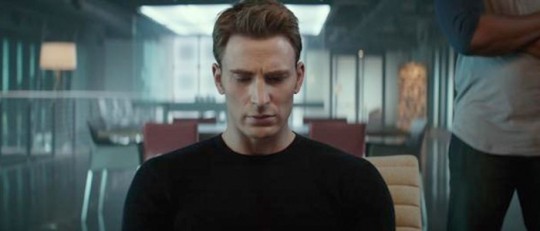

In “Star Trek” canon, the Eugenics Wars are a dark part of Earth’s history, set between present day, and the Utopian 23rd Century in which the main action of “Star Trek” is set. The famous “Star Trek” villain, Khan, comes from this time period. The Eugenics Wars occurred before Humans discovered Warp travel, or met any alien life. During this time, humanity experimented with genetic engineering, and created super-humans called Augments. Augments tended to be evil, due to superiority complexes. The most infamous was Khan, who, along with his crew of Augments, wound up cryogenically frozen, and thawed centuries later in Captain Kirk’s time.
For a “Star Trek” version of Steve Rogers, this seems fitting. Naturally, Steve is one of the “good” Augments, who was fighting for equality, against Khan. Somehow, he wound up frozen like Khan’s crew, and thawed centuries later. Just like canon-Steve, this Augment Steve is from a past war that most Starfleet officers only know from history books; and his body and abilities come from a scientific experiment that was abandoned long, long ago.
Sam Wilson: Human pilot, from an off-world colony, scarred by the Dominion War
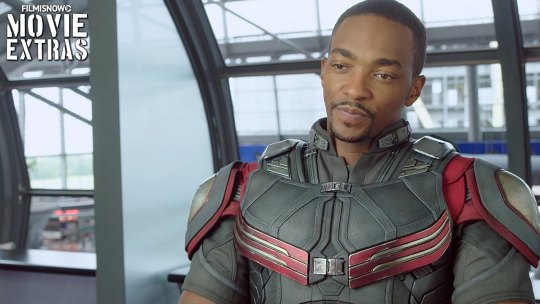
Sam would be one of the first people to welcome Steve Rogers to the 24th Century, and treat him like a regular person. His military experience and involvement in PTSD groups might be related to the Dominion War (which occurred during “Star Trek: Deep Space Nine,” and had a lasting effect on Starfleet and all of its allies, in “Next Generation” and “Voyager.”)
I feel like Sam would come from an off-world colony, maybe because he has a rougher edge to him, that an Earth-bred officer might lack. If I’m not mistaken, Sam also grew up in poverty, in MCU canon. (In “Star Trek,” Earth is a “paradise” in the 24th Century, with all poverty and prejudice eliminated; so human characters who come from bad places come from off-world, like Tasha Yar.)
Stephen Strange: Romulan turncoat, training with Vulcans
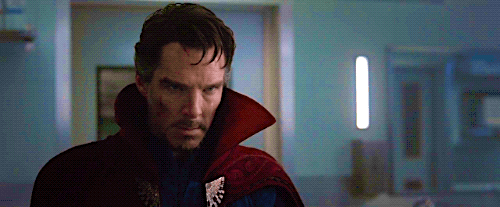
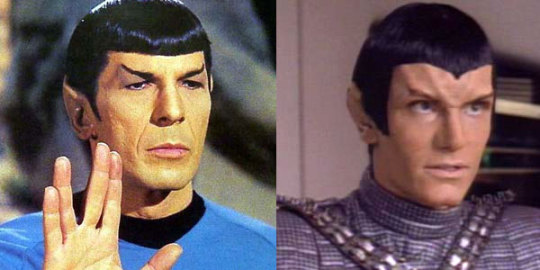
Vulcans and Romulans are evolutionary cousins. Sans the foreheads, the only significant difference is cultural. Vulcans tamed their volatile emotions centuries ago, with logic and discipline. Romulans embraced their darker tendencies, and are now more imperial. There is great animosity and distrust between the two sub-species. However, some Romulans respect the Vulcans, and seek to learn from them. (This is revealed in “Star Trek: the Next Generation.”)
The Stephen Strange we see in “Infinity War” might seem Vulcan-like. But if you watch his movie, “Dr. Strange,” he wasn’t always so. Pre-wizard Strange is like many of the Romulans you’ll see on “Star Trek:” a brilliant scientist, but very arrogant, with a volatile temper, and questionable ethics.
For a “Star Trek” Dr. Strange, I postulate a Romulan scientist who suffers an injury and loses his ability to practice. He travels to Vulcan in the hopes of curing himself, and learns from one of the most powerful Vulcan telepaths. (Vulcans have far more experience with telepathy than Romulans, who for the most part, don’t seem to even have the ability.)
Naturally, a Vulcan/Romulan Strange would also rock that evil-Spock goatee.
In short, Strange is a Romulan who converted to Vulcan-ism. His Romulan temperament still shines through his newfound Vulcan discipline, especially when he’s interacting with....
Tony Stark: Joined Trill


Here’s the one that made me hesitate, because of my “Star Trek” OC. But, here we go....
The Trill look like humans with spots on the sides of their faces, and kangaroo pouches in their tummies (for both males and females). Most of the Trill are pretty much just that. But one tenth of the Trill population is “joined” to a race of super-intelligent, immortal slugs, who live in said kangaroo pouches. Once joined, the slug--called a Symbiont--and the “host” Trill---both have their minds merged into one being. It is very important that a Trill and Symbiont are well matched before joining, or else insanity could result.
A joined Trill will replace his or her last name with the name of the symbiont. (Ezri Tigan is joined to the Dax symbiont, and changes here name to Ezri Dax.) A host will have all of the memories of the Symbiont’s past hosts, which can lead to some confusion and identity crisis.
Since Tony Stark is a character marked entirely by conflict and dualities, I can’t see him being anything but a joined Trill. The Stark symbiont is the genius engineer, and the Tony host is the playboy manchild.
Since Tony’s character is heavily driven by his past (daddy issues, guilt, etc) that could also translate into memories of past-hosts. Maybe the crimes Trill-Tony blames himself for weren’t his at all, but a past host of the Stark symbiont.
On my “Star Trek” OC, Nuvo Auz: He is not exactly a carbon copy of Tony Stark, but he’s close enough to this “Trill Tony Stark” described that I hesitated to share. But oh well. It’s fan fiction, so it’s not like originality is a major issue here.
James Rhodes: Another joined Trill, who has been friends with Stark for several “hosts”
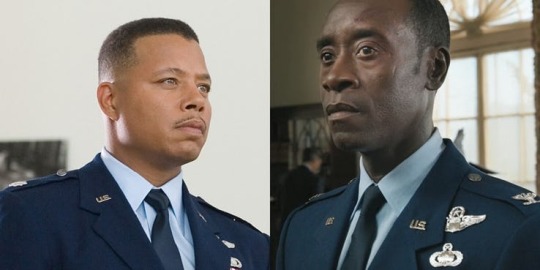
There is now a reason Rhodey changed appearances so abruptly and completely; he changed hosts! The Rhodey on the left sadly died during a mission where he was unfortunate enough to be wearing red, but the Stark and Rhodey symbionts were inseparable, even though various hosts.
The plotline of Rhodey breaking his back might also be replaced by Rhodey losing another host altogether. That would really motivate Tony, if his best friend really did partially-die, during one of their battles.
The Trill do have laws against “re-association” with past-hosts’ families and spouses, but friendships seem to be except from this rule, as Captain Sisko is friends with Dax through three hosts (Kurzon Dax, Jadzia Dax and Ezri Dax).
Pepper Potts: Unjoined Trill Telepath
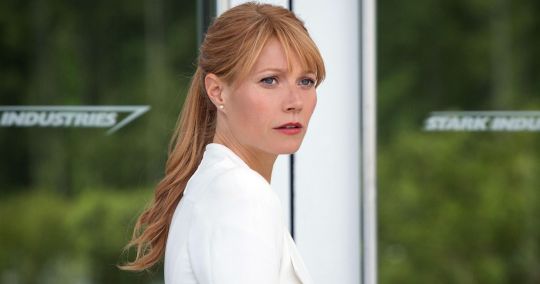
As mentioned above, most Trill are not joined. Among the unjoined Trill, a small percentage are telepathic. These telepathic Trill cannot be joined, but are important in helping with those who are. Trill telepaths guard the unjoined symbionts in their cave-lakes, and also use their telepathy to perform Trill rituals that allow a joined Trill to talk more directly with his or her past hosts.
Trill telepathy is not elaborated on in canon, so this AU has a lot of freedom in terms of what Pepper can do with her telepathy.
Pepper is the only Trill telepath who could deal with the insanity that is Tony Stark, and has been by his side for years. Her telepathy gives her sharp intuition, and she is the first to discover that Stane is betraying Tony, when she quickly reads Stane’s mind when he isn’t looking. She can sense when Tony’s in danger, and communicate with him mentally from afar.
She hates how reckless joined Trill like Tony are, since they feel immortal. She reminds him he is not immortal; his memories may be, but there will only ever be one Tony Stark, and she doesn’t want to lose him.
Morgan Stark: Get some tissues....
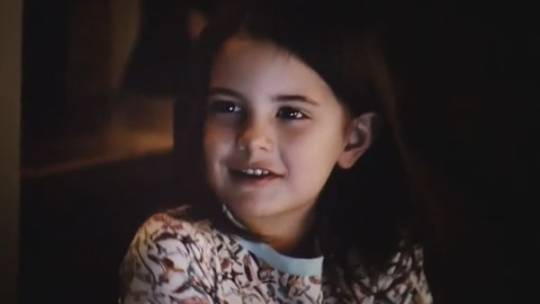
Tony, being Tony, goes against the Symbiosis Commissions rules about joining, and leaves his symbiont Stark to his daughter after his death. Morgan inherits the symbiont, and with it, all her father’s memories. She constantly hears him tell her, “I love you 3000.”
Mantis: Aenar/Betazoid Hybrid
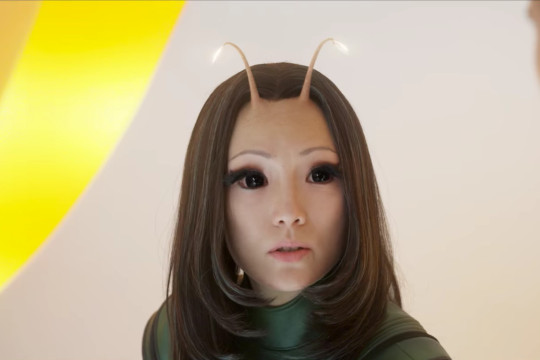
The Aenar are evolutionary cousins of Andorians (those blue guys with the antennae). The Aenar, unlike Andorians, have very powerful telepathic abilities, and live in seclusion.

Betazoids look identical to humans, except for their solid black eyes. Betazoids, as well, have a wide range of mental powers. Most are some degree of telepaths, but how powerful they are depends on the individual.
Counselor Deanna Troi, who is half-Betazoid and half-Human, cannot read minds like most full-Betazoids, but she is an “empath,” and can sense emotions from other people.
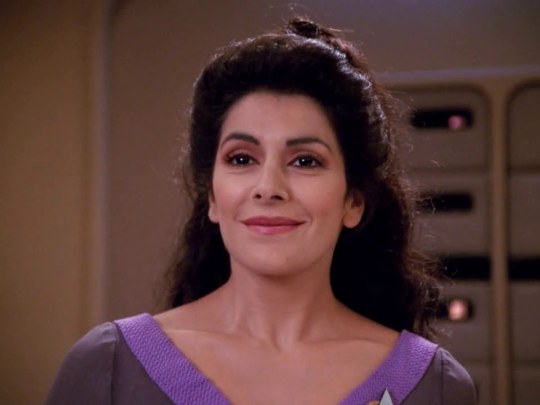
Mantis’s black eyes and empathic powers scream of Betazoid to me. But naturally her antennae and sheltered nature also scream of Aenar. I think an Aenar/Betazoid hybrid makes the most sense for her, personally.
Natasha Romanof: Low-telepath Betazoid, or Betazoid/Human Hybrid
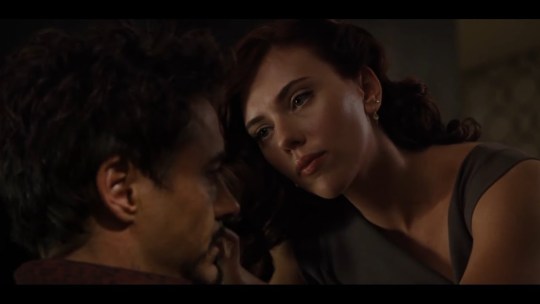
Betazoid women are stereotyped for their alluring, seductive natures. Natasha Romanov uses seduction, along with her sharp intuition, in her job as a spy. She clearly cannot read or affect others’ minds the way Mantis or Wanda Maximoff can, but Nat’s ability to read other people would make sense for a part-Betazoid, or a Bertazoid on the low-end of the telepathy spectrum.
Clint Barton: Human, or Bajoran
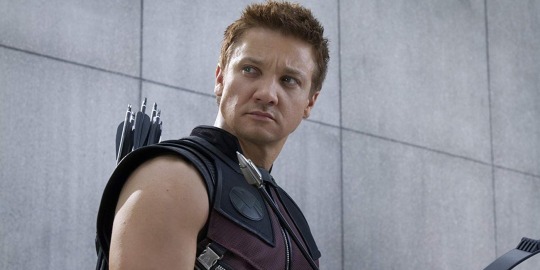
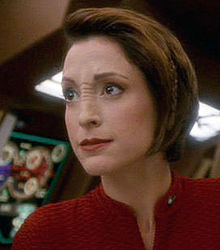
Bajorans are basically humans with wrinkly noses, and their whole planet seemingly follows one religion. All in all, not “Star Trek’s” best concept for an alien race.
I was originally going to dismiss Clint as a boring Human, but he could just as easily be Bajoran. Bajorans have a history of guerrilla fighting Cardassian oppressors, and while it’s never stated in canon, I’ve always gotten the impression that Bajorans were more nimble and stealthy than humans. After recently winning their home planet back from the Cardassians, Bajorans are trying to rebuild their lives and families. Many are farmers. This all seems fitting enough for Clint.
Otherwise, Clint might simply be the token boring Human onboard. Like Miles O’Brian of DS9, Clint is the family man in the group, and...not much else. He could even relate to Miles over having a relatively mundane-seeming job compared to the other characters (Miles sat at the transporter controls when on the Enterprise, and is the subject of much ridicule in the fandom for this.)

Thor: Klingon, son of the current emperor
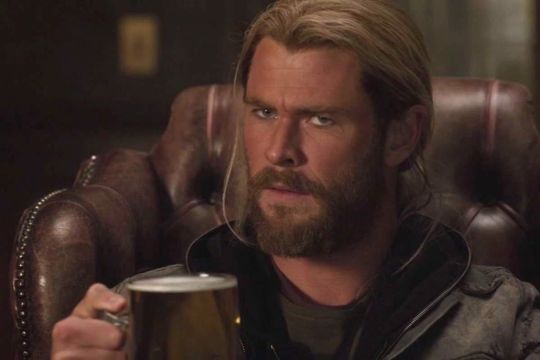
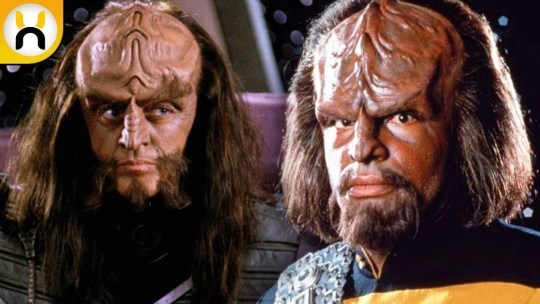
If you’re new to “Star Trek,” you might be thinking, “No way, pretty Thor, one of those ugly lizard things from ‘Star Trek: Discovery’ and the recent movies?” Well I’m thinking more of the Picard-era Klingons for this one.
Yes, Klingons are warriors--and specifically, they are largely based on stereotypes of Vikings--but not all Klingon characters are vicious monsters. Many are jolly and full of honor, and love to drink mugs of bloodwine while telling exaggerated tales of their glorious battles. Picturing Thor, and all of his Asgardian friends, as Klingons, each with their own unique Klingon forheads, armor and weapons, is just too great.
Loki: Changeling orphan raised by Klingons, who later allies with the Dominion
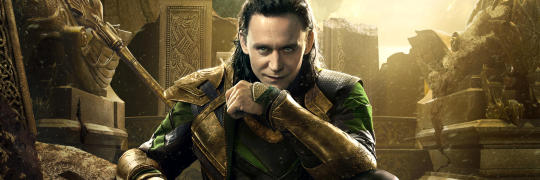
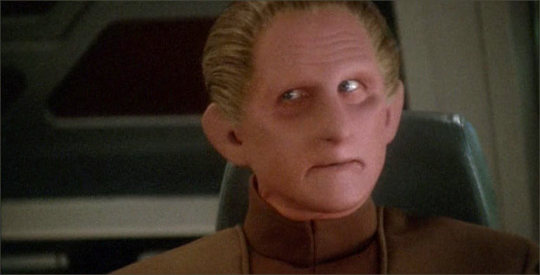
Introduced on “Deep Space Nine,” the Founders, AKA “Changelings,” are a species from the other side of the galaxy. Their true form is silver syrup, but with practice, they can take any form, depending on how skilled and experienced they are. The Founders are rulers of the Dominion, a sort of evil counterpart to the Federeation. Their subject species worship them as gods, and the Founders hope for galactic domination.
To gain more information on the rest of the galaxy, the Founders often send baby Changelings out into the universe, to grow up among alien species, so they can come back and share their experiences with the rest of the Great Link (the sea of silver jelly that makes up the Founder homeworld). Unfortunately, the Founders don’t seem to plan this very well, as they give the baby Changelings no way of knowing where they’re from, why they were sent away, or what they’re supposed to do. Odo, a main character on “Deep Space Nine,” grew up an orphan and the only one of his species, having no clue of his origins.
Now if this isn’t all Loki in a nutshell, I don’t know what is.
Emperor Odin found the baby Changeling, and taught him to take a Klingon form. Loki grew up very bitter about not knowing his origins. When he did finally learn of the Founders, he was eager to return to the Great Link and prove himself, and became one of the Dominion’s highest agents. Loki was far more skilled at shape-shifting than Odo (as many Founders were), and could take any form with ease.
He tried to take over the Klingon Empire by impersonating his father; he led a Dominion Army to try to conquer Earth; and in the end, he switched sides and died trying to save his brother and the Klingon Empire....or did he?
Bruce Banner: Human/Klingon hybrid (either natural or artificial)
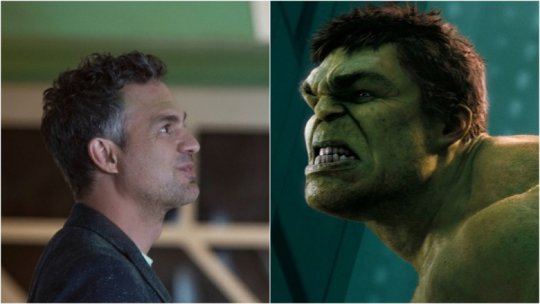
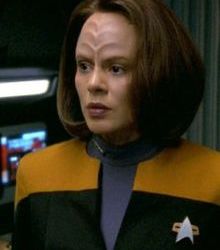
There are several part-Klingons in “Star Trek” canon. One of them, B’Elanna Torres ( “Star Trek: Voyager”) is a brilliant engineer, who is constantly frustrated by her Klingon temper interfering with her work. Bruce Banner could just as easily be in the exact same boat as her, though his personality would be different than hers. (B’Elanna often combats her rage with sarcasm, and has a lot in common with Tony Stark in that regard.)
B’Elanna is a born hybrid--one human parent, one Klingon parent. There are others, however, who are “artificial hybrids;” a person born one species, who, through some genetic engineering or mistake, ends up with traits of the other species fused into them. Klingons experimented with genetic engineering on themselves to try and disguise as Humans, to infiltrate Star Fleet. (This was a retcon in “Enterprise,” to explain why the Klingons in the Original “Star Trek” look so Human, and nothing like the Klingons of TNG-onward. A Klingon-engineered-to-look-human also appears on “Discovery.”)
Bruce Banner could just be a born hybrid like B’Elanna... but if one wants to tie in his MCU backstory into this “Star Trek” AU, it may make sense to go the “military genetic experiment gone wrong” route. Admiral Ross (no “generals” in Starfleet, don’t ask me why) may have ordered Bruce to test this method of disguising humans as Klingons on himself, and it went horribly wrong.
King T’Challa: Human, from a separate colony that still practices genetic engineering

In “Star Trek,” it is not uncommon for members of one specific ethnic group to build a colony on an alien planet, based entirely around that one culture. (Or stereotypes of it. “Star Trek” is kind of clumsy with how it handles real life cultures, unfortunately.) There’s a colony of Scottish people, where Dr. Crusher’s nanna lives. Commander Chakotay’s culture was a tribe of Native Americans who left Earth and set up a colony on another planet to preserve their culture.
Wakanda could just as easily be the same case. In addition to preserving their culture, the Wakandans might also have left Earth so that they could continue using genetic engineering, a practice that Starfleet has banned (after the Eugenics Wars). In the Wakanda Colony, genetic manipulation is handled very carefully, and only the ruling king becomes a full-on Augment.
Gamora: Orion pirate
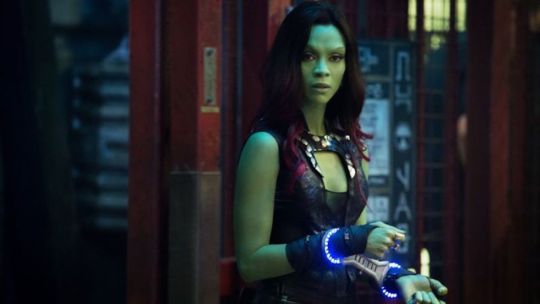
Orions are a green-skinned race, known to be pirates and slave traders. Orion women emit pheromones that seduce males of other species, though it’s unclear if this always true, or how much control they have over it.
Trekkies tend to think of Orion women as scantily dressed slave dancers, but latter “Star Trek” incarnations have female Orions in other roles, often as badass pirate traders and leaders, and sometimes even Starfleet officers. They do have a tendency to wear kinky black leather though, and the last Orion woman we saw on “Star Trek: Discovery” was a dead-ringer for Gamora!
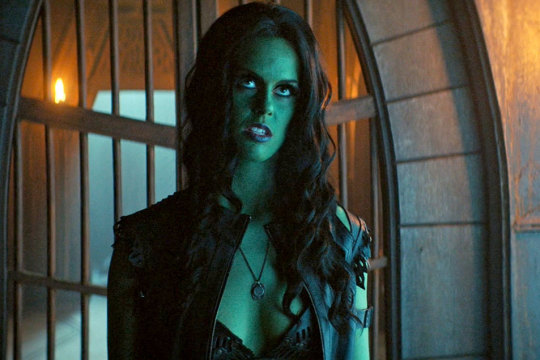
Bucky Barnes: Liberated Borg Drone

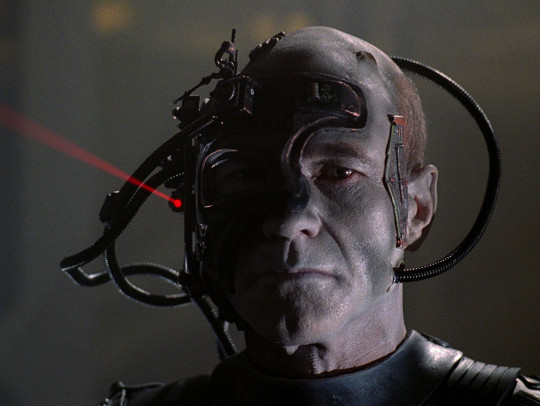
The Borg are the single greatest villains in “Star Trek,” and are every bit to “Star Trek” what Hydra is to the Avengers. The Borg are a race of half-machine cyborg people, whose minds are all enslaved to one collective Hive Mind. Their goal is to assimilate the entire galaxy. On “Star Trek,” we’ve met several characters who were assimilated by the Borg, but later escaped, and struggled to reclaim their humanity.
It happened once to Captain Picard; he was assimilated, and forced to wipe out an entire Federation fleet, under the influence of the Borg, before he was rescued by the Enterprise. On “Voyager,” Seven of Nine--formerly Annika Hanson--was assimilated with here parents at age 6, and wasn’t rescued until 18 years later. She spends four years on the show regaining her humanity, wrestling with the guilt, and coping with the trauma.
Borg-Bucky can tie into Trill-Tony this way. Perhaps a previous Stark host was assimilated along with his entire family by Borg-Bucky, and somehow, the Stark symbiont was rescued and able to move into a new host. Since this is "Star Trek,” it’s also perfectly believable for that massive plot line to get abruptly dropped and never mentioned again. (Sorry, I’m still salty about that...)
Wanda Maximoff: Ocampa, from Suspiria’s Array
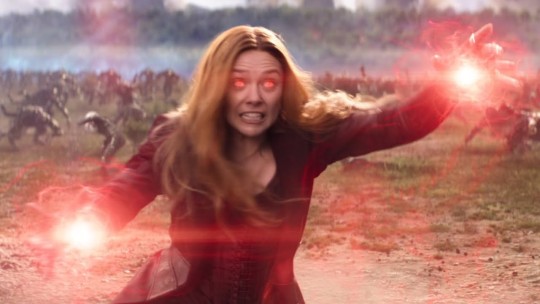

This is another one from “Star Trek: Voyager.”
The Ocampa are a race of telepaths, but how powerful they are depends on which sect they come from. Centuries ago, another race called Caretakers (a race of super-intelligent blobs) accidentally turned the Ocampan home-world into a desert. One Caretaker kept a bunch of Ocampans underground on their dead homeworld, and provided for them. Being dependent for so many generations caused their powers to weaken, until basic telepathic conversation was all they could do.
But the other Caretaker, named Suspiria, took a few Ocampa lightyears away to live on a space station, where she encouraged them to exercise their powers to the max. Their abilities included telekenesis, and inducing spontaneous combustion in plants. These Ocampa were more sinister than the other kind. I think this would be as good a backstory as any for MCU-Wanda Maximoff. After nearly destroying the ship, she switches sides, and tries to tame her incredible mind powers, and only use them for good.
Also, Ocampans only live 9 or 10 years, and are fully grown by age 2. This could explain some of the confusion surrounding Wanda’s age, with characters treating her like a kid one minute, and a soldier to bring into battle the next.
This is another one that’s vaguely similar to one of my OCs, though my Ocampa character is almost nothing at all like Wanda. But, she is an Ocampa from Suspiria’s array.
Ava Starr: Human mutated by a freak transporter accident
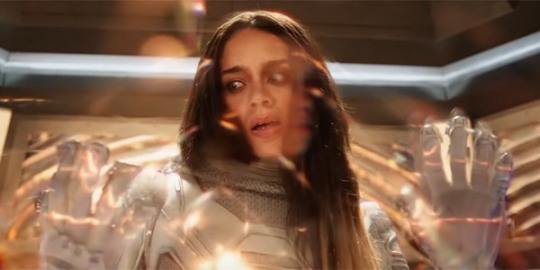
There’s an episode of “Star Trek: the Next Generation” where Lt. LaForge and Ensign Ro get into a transporter accident that essentially turns them into ghosts. Here, something similar happened to poor Ava Star, but she could sometimes maintain solid form, and was visible to others, even when phasing.
Her father was attempting to open a gateway to either the Mirror Universe or Fluidic Space, or some such other dimension, and it literally blew up in his face. He and Ava’s mom died, and they were the lucky ones.
Ava was then taken advantage of by Section 31 (basically the Federation’s CIA), and used for classified missions. And now she is just so done with everything and everyone, and just wants a cure.
Hank Pym: Eccentric scientist who rejects Starfleet
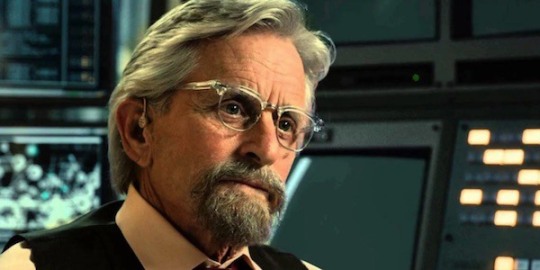
There are quite a few of these in the world of “Star Trek” (Data’s creator, Seven of Nine’s parents). Some scientists just think Starfleet is too controlling, or corrupt, or they just hate people, or the writers just want an easy way for a scientist to be up to something Starfleet doesn’t know about.
Hank Pym was a prominent Starfleet scientist, until Howard Stark tried to steal his research. Pym quit Starfleet, and tried to find a place to settle to continue his research undisturbed. But his ship crashed on an alien planet. He almost died in the alien wilderness, until the planet’s dominant species--a race of super-intelligent insecticides--took him in and adopted him into their colony.
Pym now trusts neither Starfleet nor “Starks,” regardless of who the current Stark host is. The only ones he trusts are his faithful companions and minions, the ants.
Hope Van Dyne: Pym’s estranged, half-Vulcan daughter, who works for Starfleet
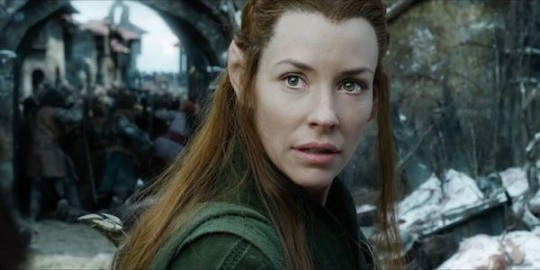
Unlike Spock, she doesn’t try to mask her emotions and be entirely “Vulcan.” But she does practice lots of Vulcan control and sardonicism, to deal with her resentment towards her father for her mother’s (supposed) death.
Janet Van Dyne: Pym’s Vulcan wife, thought killed in a space anomaly, but actually stranded in Fluidic Space
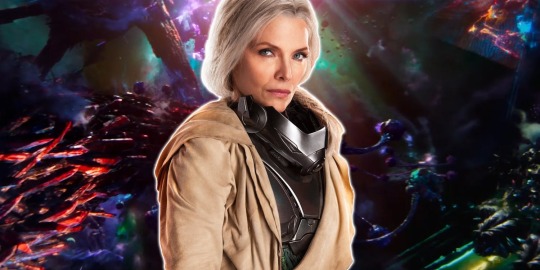
Fluidic Space is another dimension, where Species 8472 live (from “Star Trek: Voyager”)
Scott Lang: Lower-decks crewman who everyone thinks is gonna die a redshirt’s death, but turns out to be a badass

And because he’s a dopey human who makes funny quips and is the butt of endless jokes, he will end up with the half-Vulcan woman who can’t stand him.
Peter Quill: Human, from the 20th Century

Time travel is rampant in “Star Trek,” so Peter Quill’s character can stay pretty much exactly the same as he is in MCU-canon.
Nebula: Bolian, ex-Borg Drone
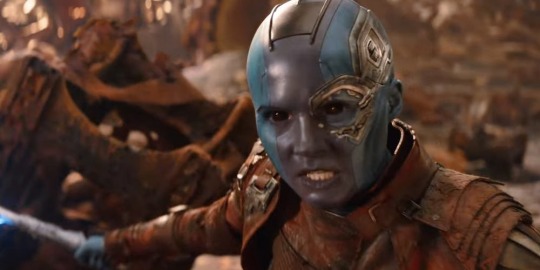
Bolians are bald blue people, and.....that’s about all we know about them. Well, they supposedly are also all motor-mouths, but you know, stereotypes. Anyway, being assimilated would make even the chattiest person turn pretty antisocial.
Her eye-implant is also a LOT like Seven of Nine’s.


Carol Danvers: Human-Q hybrid, Starfleet pilot
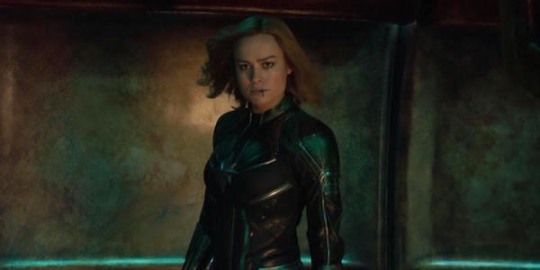
The Q are among the most powerful beings in the Universe, as well as some of the most sinister. The main Q character we know on “Star Trek: the Next Generation” and “Voyager” has dealt at least twice with young Qs, who he was rearing with questionable methods. In the TNG episode “True Q,” Q mentors young Amanda Rogers (an orphaned Q raised by humans), in a way that is very reminiscent of Yon Rogg’s mentoring of Vers.
Is it possible for Q to reproduce with non-Q? Who knows, but since the Q seem capable of damn near anything, I don’t see why not. Though, if we’re keeping things close to MCU canon, then Carol may have been born a regular human, and only became part-Q after a bizarre accident.
In any case, she is no longer with the Q Continuum, and now fights for justice independently, or with Starfleet.
Peter Parker: Kid genius, except likable. The Anti-Wesley.


During “Infinity War,” my friend said Peter reminded her of Wesley, and I said, “Never say that again, or I’ll beam you into a black hole.”
Anyway, Peter would be a kid-genius serving on a ship like Wesley (but likable), and like Reg Barclay, would end up becoming part spider, due to one of the many bizarre anomalies the ship runs into every week.
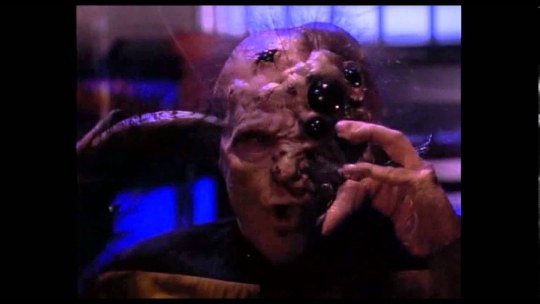
If canon-Peter was enamored with Iron Man, just picture this Peter’s excitmenent upon learning that the chief engineer is a joined Trill, who has lived multiple life times, and all of the inappropriate questions he’d pester Tony with, like, “What’s it like to die? What’s it like to die three times? Were any of your deaths really badass? Like, did you ever go out blowing up a Borg cube or get blown into space or something?”
“This is why some species eat their young.”

Friday: Hologram

In “Star Trek,” holograms--by the 24th Century anyway--look and even feel like solid, real people. Which begs some very disturbing questions about the fact that they’re created as basically slave labor. But Tony at least would never treat any of his holograms like mindless appliances to toss away, and if any of them wanted to leave he wouldn’t stop them.
Anyway, Friday is a hologram he programed after Jarvis was integrated into Vision. And she is a badass.
Vision: Soon-type android, with a hologram and alien technology mixed in
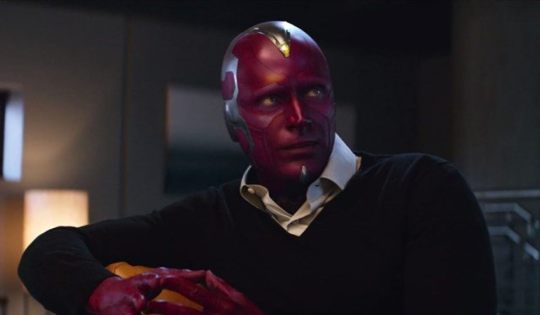
Kinda self-explanatory, not sure what else needs to be said.
Thaddeus Ross: insane admiral

Alongside doomed redshirts and and promiscuous male commanding officers, the evil insane admiral is one of “Star Trek’s” oldest and most treasured traditions. It does get to be a bit concerning after a while, that there are so many insane admirals in the Federation. Some fans theorize that Starfleet promotes bad captains to admirals to keep them off starships, figuring the occasional crazy admiral grabbing at galactic domination is better than a crazy incompetent captain every week. Whatever the reason, insane megalomaniac admirals plague Starfleet.
Thaddeus Ross is one such admiral. Previously leader of a fleet of starships, he was promoted to an even higher brand of admiral after the fiasco with Bruce Banner. Unfortunately, it turned out that giving this twit even more power was, shockingly, a bad idea.
If I think of more, I may update this. But I think these are the main ones I have AU ideas for.
#ellisper#star trek#avengers#Guardians of the Galaxy#dr strange#mcu#ironstrange#strangeiron#winteriron#stucky#falcon#trill#vulcan#romulan#dax#ocampa#wanda maximoff#scarlet witch#defense#pro#peter parker#iron dad#spider son#klingon#thor#bruce#banner#hulk#rdj#Robert Downey Jr
233 notes
·
View notes
Text
Best Tv Series Of All Time
'South Park' 1997-Present
Matt Stone and Trey Parker touched America somewhere specific and deep, and also you must respect their authori-teh. Year after yr, this cartoon began, Matt Stone informed Rolling Stone, "We would see achievement as lastly getting to the point where we get canceled because no one gets it." So here's to not exactly twenty years of failure – and hopefully 20 more.
youtube
'Monty Python's Flying Circus' 1969 74
And now for some thing completely various. The best comedy cock tail – five British intellectuals along with a token American clod, Terry Gilliam, running amok about the BBC. Monty Python were the Beatles of comedy, each one an indispensable aspect in the chemistry, from John Cleese rage to Eric Idle -stick wordplay. The Pythons were godfathers to all ambitious jokers who adopted – Lorne Michaels and Chevy Chase satisfied in line for an Ultimate Goal screening. But these 45 episodes stay the comedic equivalent of Mount Everest: the mountain with all the biggest tits on earth, forbidding, aloof, terrifying.
youtube
'Game of Thrones' 2011-Present
The night is dark and full of terrors, particularly. With its premise of "The Sopranos in middle earth," it is the HBO fantasy sequence that broke through style boundaries to stake its claim as one of the most compellingly realistic dramas on the air, going beyond George R.R. Martin's publications. It may grab attention with the nudity, the dragons and severed heads, but in your mind it's a thriller. As Martin told Rolling Stone, "History is written in blood, a gold mine – the kings, the princes, the generals along with the whores, and all the betrayals and wars and confidences. It's better than 90 percent of exactly what the fantasists do make up."
youtube
'Cheers' 1982 93
You need a place where everybody knows your title – even supposing it's just a dive-bar in Boston total of regulars with no place else to go. Cheers started with an emphasis on the mis-matched passionate banter between Ted Danson's washed-up Red-Sox pitcher Sam and Shelley Long's up tight bookworm Diane. ("Over my dead body!" "Hey, do not b-ring last night into this.") But it regularly renewed it self by bringing in new blood like Kelsey Grammer, Kirstie Alley and Woody Harrelson. Cheers was like that bar, to the point where you can tune in to see which regulars would hang tonight.
youtube
'The Daily Show' 1996-Present
The fake news show that became more credible in relation to the news. Comedy Central began The Daily Present in 1996, when Jon Stewart took over in 1999, but it hit its stride. The Everyday Present got more abrasive as the the headlines got worse. Stewart had the rage of a man who'd signed on in the end of the Bill Clinton years, only to finish up with an America significantly scarier and uglier for, and also the anger showed. "It really is a comic box lined with sadness," he advised Rolling Stone in 2006. While the franchise struggles on without him, Everyday alumni John Oliver and Samantha Bee keep that hardhitting spirit on their own shows.
youtube
'Twin Peaks' 199091, 2017
"These women are authentically dreamy," Twin Peaks auteur David Lynch told Rolling Stone in 1990. "They are all just chef chicks. And they're just jam-packed with strategies." The little town of Twin Peaks is complete of the women as well as their deadly secrets, from senior high school homecoming queen Laura Palmer that is murdered to alive-and- how seductress Audrey Horne. Several years after Blue Velvet, Lynch's surreal Pacific Northwest secret followed Kyle MacLachlan as FBI agent Dale Cooper, on a search for damn-good espresso along with the the answer.
youtube
'Deadwood' 2004-06
Al Swearengen's moral philosophy: "You can't cut the throat of every cock-sucker whose character it would boost." Spoken like a Founding Father that is true. He is the villain of David Milch's epic Western set in the mud and slime of an 1870s South Dakota gold-mining camp. At the center of it all (i.e., the saloon), Ian McShane's Al glowers, pours drinks, counts money and slices jugulars, in a frontier hellhole total of prospectors, whores, drunks and lost freaks looking for one last deadly fight to get in to (and often finding it at Al's spot). It was like McCabe & Mrs. Miller with mo Re depressing intercourse scenes. The first two seasons are strong gold, the third, flimsier, but Deadwood is about how communities get constructed – and every one of the dirty function that involves.
youtube
'The West Wing' 1999-2006
Aaron Sorkin gave America the the first choice we didn't really deserve in the benevolent President Jed Bartlet of Martin Sheen, a high-toned Catholic professor from New Hampshire. Premiering in late 1999, The West Wing played the same as a Bubba-period fantasy of the way the political potential would appear (like in case the Democrats had a little more bravery, or in the event the Republicans had a theory or two) that soon ended up being utterly out of step with the Bush-Cheney years. But Sorkin's trademark rapid-fire dialogue as well as the Bartlet administration's idealism created this a parallel-universe that was a welcome.
youtube
'Louie' 2010-Present
Louis C.K.'s stubbornly auteurist FX sit-com doesn't look or sense like any such thing else on Television – he writes, directs and stars as himself, a single-dad stand up comic in New York. If Louie wants to display himself in the car air-drumming to "Who Are You?" and mortifying his daughters, he goes for this. If he desires to abandon the half hour comedy format completely for an extended indie-movie vibe with Charles Grodin and Ellen Burstyn, he does that too. Louis C.K. May vanish in to his own head for whole seasons, however totally original emotional peaks are also hit by him just like the one when he inadvertently makes a buddy that is male and travels to Miami. (No, it does not last.)
youtube
Third Watch Season 6
'Star Trek' 196669
The Star-Ship Enterprise took off using a five-year mission: "To discover odd new worlds, to seek out new life and new civilizations," and it succeeded in making the most beloved of sci-fi franchises, maybe not just inspiring countless spin offs but also codifying fan fiction as an art form. Gene Roddenberry's original collection remains the the inspiration, with William Shatner's awesomely pulpy Capt. Kirk, Leonard Nimoy's logical Mr. Spock, Bones, Sulu, Uhura and Scotty. They speak to strange and inexplicable lifeforms – Romulans, Gorns, Joan Collins. During its three years, Star Trek endured low ratings until NBC pulled the plug, but thanks to the most doggedly faithful of TV cults (remember when "Trekkie" was an insult?), Roddenberry's vision lives long and prospers to the day.
youtube
1 note
·
View note
Text
Star Trek: Lower Decks Episode 4 Easter Eggs & References
https://ift.tt/eA8V8J
This Star Trek: Lower Decks article contains spoilers.
With most new Star Trek shows, locating the Easter eggs and references takes probably at least two viewings. But, with Lower Decks, you can watch an episode four times and still be missing references and Easter eggs. This is saying something when you also consider that these episodes are half as long as episodes of Discovery or Picard. So, with that in mind, like in the previous episodes, there is almost certainly something we missed in trying to gather all the Easter eggs and references from Lower Decks episode 4, “Moist Vessel.”
From a surprise guest star (Haley Joel Osment) to a heartwarming story about Mariner and Captain Freeman (briefly) becoming allies, this episode was about a lot more than just Easter eggs. But that’s not why you’re here. You came for the Trekkie eggs and you shall have them!
Here’s all the deep-cuts and references we caught in Lower Decks episode 4, “Moist Vessel.”
USS Mercet
This episode finds the USS Cerritos teaming-up with another starship of the exact same class, the USS Mercet. Like the Cerritos, the Mercet is a California-class starship, and, just like the Cerritos, is named for a town in California. We can only imagine what the USS Berkley is like.
Ancient generation ship
The concept of a “generation ship,” is a super-old sci-fi trope, which has appeared in everything from the Robert A. Heinlein novel Orphans of the Sky to the Doctor Who episode “The Ark in Space.” Generally speaking, generation ships carry multiple generations of people, because faster-than-light travel is not possible. Sometimes this also means the ships are sleeper ships, too, i.e. containing people in suspended animation. The earliest generational ship in Star Trek appeared in the TOS episode “For the World Is Hollow I Have Touched the Sky.” In at least two alternate realities, the USS Voyager (“Shattered”) and the USS Enterprise NX-01 (“E²”) both became generational ships, in which the crews’ decedents became the new crew in the future.
Terraforming Emulsion
Much of the conflict in “Moist Vessel” happens because an inert “terraforming emulsion” is let loose and begins turning parts of the ship into self-contained biospheres and/or ecosystems. Like generation ships, terraforming is a pretty big sci-fi trope that doesn’t appear in Trek all that often. The most famous piece of terraforming tech in Trek history is easily the Genesis Device from The Wrath of Khan and The Search For Spock. Like the terraforming emulsion, the Genesis Device had an instant effect. In “Moist Vessel,” the terraforming emulsion is described as something to the ancient aliens had “to “to use it on a dead planet they could call home.” In The Wrath of Khan, Dr. Carol Marcus uses a “moon or other dead form,” as the ideal place to use the Genesis Device.
Tellarite
Captain Durango is a member of the Tellarite species. He is also the first Tellarite we’ve seen in the TNG era. The first Tellarites appeared in the TOS episode “Journey To Babel.” Like the Andorians and the Vulcans, the Tellarites are founding members of the Federation. Star Trek: Discovery has given us several 23rd-century Tellraties in episodes like “The War Without. The War Within,” and the Short Treks episode “The Escape Artist,” which was, of course, written by Lower Decks showrunner Mike McMahan.
Hull colors on the Mercet and the Cerritos
Since its debut, fans have noticed that the Cerritos has gold/yellow ring on its saucer. Meanwhile, the Mercet has the exact same stripe of color, only blue. Just before the launch of Lower Decks, McMahan explained that because the Cerritos is a second-contact and engineering vessel, that its outward color is yellow, which mirror the yellow/gold colors worn by engineering and security officers. “In the California-class [line], there are three types of hull painting: there’s blue, red, and yellow,” McMahan. This means we can infer that the Mercet is more of a science vessel than the Cerritos, despite the fact the ships are the same class.
Sarcastic Vulcan salute
As Mariner is leaving Captain Freeman’s Ready Room, she flashes the famous “live long and prospers” Vulcan salute. Freeman yells, “Don’t give me that sarcastic Vulcan salute!” Interestingly, we haven’t seen the Vulcan salute used sarcastically or ironically all that much. Although, in Star Trek 2009, Spock did say “Live long and prosper,” with such venom that it almost scanned as “fuck you.” In Discovery, we also learned that “The Vulcan Hello,” was not the Vulcan salute, but instead, firing upon a Klingon vessel without checking first.
Beings of pure energy
This one was easy. When Tendi is talking to Rutherford about a crew member named O’Connell (Haley Joel Osment) who is going to try to ascend into a higher plane of existence, Rutherford says, “Oh, like a Q! Or, the Traveler!” The Q obviously references the Q Continuum, first seen in “Encounter at Farpoint.” In terms of a “regular” person becoming a Q, that happens in the TNG episode “True Q,” in which a woman named Amanda Rogers realizes she can become a being of pure energy. The Traveler refers to the alien of the same name from the planet Tau Alpha C. (Though sometimes, this was said to be Tau Ceti.) The Traveler himself didn’t exactly become a being of pure energy, but he did help Wesley Crusher “ascend” beyond the physical realm in the TNG episode “Journey’s End.”
However, in Nemesis, just one year before Lower Decks, Wesley Crusher was glimpsed at Riker and Troi’s wedding in a Starfleet uniform, implying he was, in fact back in Starfleet. (Wesley also had a new rank of Lieutenant, which seems to indicate he had returned to the service.) So, does Rutherford know about Traveler stuff from Wesley? And is that because Wesley is actively a part of Starfleet again — an officer who is also a being of pure energy?
Holodeck waste removal
Throughout TNG and DS9 it is strongly suggested that people have sex with holograms. This is implied in TNG episodes like “11001001,” but pretty much stated outright in DS9, specifically the episode “Merdiain,” in which Quark is outright commissioned by a sleazy client to create a holographic duplicate of Kira for erotic purposes. Later in “Moist Vessel,” when Ransom and Freeman are talking about what Mariner is doing, they say Mariner is “emptying BEEP out of the holodeck’s BEEP filter.” We all know what they mean.
Debating the Prime Directive
When Mariner is called in to join a senior staff meeting, she jokes “Are you guys debating the Prime Directive again?” In fairness, most debates about the Prime Directive do tend to occur in conference rooms like this one.
Conference room chairs
Mariner quickly discovers the senior staff is debating about the furniture in the briefing room. “A beige chair with a strip of leather right down the middle,” is mentioned. This could refer to a chair Picard had in his personal quarters throughout The Next Generation, which had a strange piece of fabric running right down the middle. The briefing room chairs in Voyager also had at least two leather-ish sections at the top and in the middle.
Everyone folds at poker all the time
When Marnier joins the senior staff’s poker game, she is chastised because she decides to go “all in.” She also points out that most of the characters tend to fold, just when things are getting interesting. This references several episodes of TNG in which the senior staff play poker together and tons of people fold. In “The Best of Both Worlds,” Wesley folds only to discover, in the end, that he would have had the winning hand.
Taco Tuesday
When Tendi is talking to Rutherford about needing to be liked, it looks like she is having a taco. This could mean that the USS Cerritos has Taco Tuesdays in the mess hall, just like on the USS Discovery, about 120 years prior. In the Short Treks episode “Calypso,” the sentient computer of the Discovery, Zora, claims at one point, it is “Taco Tuesday.”
Tamarians
At one point, Tendi lists off an “ascension process for the Tamarians.” The Tamarians are also known as “The Children of Tama,” and appeared in the TNG episode “Darmok.”
Moriarty!
While Boimler is caught talking to himself, he briefly pretends to be talking to a non-existent hologram on the Holodeck, specifically, Moriarty. This references the sentient holographic version Professor James Moriarty (Daniel Davis), first introduced in Trek canon in the TNG episode, “Elementary, My Dear Data.” In that episode, Moriarty was accidentally brought to life when Geordi asked the computer to create someone who could defeat Data in a Sherlock Holmes simulation. Moriarty reappeared in the episode “Ship in a Bottle,” and attempted to take control of the Enterprise from the holodeck. At the end of the episode, Picard and the crew trapped Moriarty in an endless simulation, in which Moriarity believed he had won his freedom.
The character of Moriarty, of course, originates in the canon of Sir Arthur Conan Doyle’s Sherlock Holmes stories and novels, specifically the short story “The Final Problem,” and the novel, The Valley of Fear. Within Star Trek canon, it could be debated that Sherlock Holmes and Moriarty are not fictional characters, but rather quasi-historical ones. In The Undiscovered Country, Spock attributes a Sherlock Holmes quote to “an ancestor,” which seems to imply Spock is related to Sherlock Holmes on his human side. Or, maybe Spock was referring to Doyle, and not Holmes. Or perhaps, as many Sherlock Holmes fans and scholars have maintained for decades, Doyle was simply the real-world literary agent for Dr. Watson, and both things are true.
The notion of Watsonian (in-universe) and Doylist (real-world) viewpoints relative to canon originates, naturally, within Sherlock Holmes scholarship and fandom. However, these viewpoints also heavily apply to Star Trek, insofar as both viewpoints are often required to reconcile various canon discrepancies.
In fact, from a Watsonian viewpoint, the reference to Moriarity implies that Boimler is aware of the infamous holographic Moriarity from the Enterprise, and that, perhaps, that Moriarty escaped the “Ship in the Bottle” simulation and is terrorizing various holodecks throughout Starfleet. But, from the Doylistic standpoint, this is mostly just the Lower Decks writers making a fun reference to the TNG episode in which the holodeck goes bananas. Finally, any Sherlock Holmes references in Trek tends to be meta even when you don’t talk about Data and Spock. Both Nicholas Meyer (director The Wrath of Khan and The Undiscovered Country) and Michael Chabon (showrunner of Star Trek: Picard) wrote their own Sherlock Holmes pastiches. In fact, in Meyer’s first Holmes book – The Seven-Per-Cent Solution — Moriarty turns out to be a hallucination created by Sherlock Holmes’ grief and cocaine addiction. So, in The Next Generation, Moriarty was a hologram. But in Nicholas Meyer’s Holmes canon, Moriarty is an outright delusion!
The voice of the Cerritos references… Captain PIke?
Though uncredited, the voice of the ship’s main character in this episode is played by Vanessa Marshall. The fact that the computer says “Hitting It” in reply to Captain Freeman saying “Hit it” could be a reference to Captain Pike saying “Hit it” on Discovery Season 2.
Also, the computer getting sassy in general has a precedent in the TOS episode “Tomorrow Is Yesterday.”
Captain Freeman’s first name is Carol
Not only is this the first episode that Mariner calls Captain Freeman “mom,” but we also hear Freeman’s first name spoken aloud: “Carol.” This entire episode is about terraforming, and the creator of the Genesis Device in Star Trek II: The Wrath of Khan was named Carol Marcus. This seems intentional.
O’Connell becomes… V’Ger?
When O’Connell’s ascension actually does end-up happening, aspects of it visually look a lot like when Decker became part of the massive A.I. known as V’Ger in Star Trek: The Motion Picture. O’Connell also briefly has wings, which could reference the Red Angel in Star Trek: Discovery, but probably not.
Spock visors
Just before Mariner and Freeman meet-up with an admiral in the conference room, we see Cerritos crew members vacuuming-up the terraforming emulsion. But, they’re wearing red visors while doing it. This seems like a reference to Spock’s red visor in the TOS episode “In Truth Is There No Beauty?” In that episode, Spock wore the visor to prevent himself from going insane by looking directly at a creature know as a Medusan. The Medusans were last referenced in the Star Trek: Picard episode, “Broken Pieces,” when Rios’ engineering hologram talked about “Medusan astrogation.”
Starfleet medals, DISCO-style
The medals that Mariner and Freeman receive at the end of the episode are almost identical in style to the medals that the entire crew of the Discovery were given in the Season 1 finale episode “Will You Take My Hand?” This is most likely the “Starfleet Medal of Honor,” which is given for acts of valor. The insignia on the medal is a little different than the DISCO versions, but that blue stripe on the fabric is unmistakable. Interestingly, in “Will You Take My Hand?” the vast majority of characters who received medals, were, not primary cast members, and, it could be argued, were part of the “Lower Decks” of Discovery, even if they worked on the bridge.
Star Trek: Lower Decks airs new episodes on CBS All-Access on Thursdays.
The post Star Trek: Lower Decks Episode 4 Easter Eggs & References appeared first on Den of Geek.
from Den of Geek https://ift.tt/2YCHL8W
1 note
·
View note
Text
Best Tv Shows All Time
'The Daily Show' 1996-Present
The fa-Ke information display that became mo-Re credible as opposed to news that is real. Comedy Central started The Everyday Show in 1996, but it hit its stride when Jon Stewart took over in 1999. The Everyday Present got more politically abrasive as the the headlines got worse. Stewart had the rage of a man who'd signed on in the conclusion of the Bill Clinton years, only to finish up with an America much more scary and more ugly for, as well as the anger showed. "It's a comic box lined with unhappiness," he informed Rolling Stone in 2006. While the franchise struggles on without him, Samantha Bee and Daily alumni John Oliver keep that hard-hitting spirit alive on their shows.
youtube
'The Office (U.K.)' 2001 03
Ricky Gervais created one of TV's most agonizing comic tyrants in David Brent – a bitter, awkward, pompous ball of vanities terrorizing his workers at a London paper company. He fidgets, fondles his tie, cracks awful jokes, plays guitar ("Free Love Freeway"!), invisible to anyone except the longsuffering office drones who need to put up with him. This mockumentary raised the cringe level of sitcoms everywhere, spawning the surprisingly fantastic U.S. version (also on this checklist) while paving the way for the glories of Parks & Re-Creation and Peepshow.
youtube
'Sesame Street' 1969-Present
No kiddie present has ever been as fiercely beloved as this urban utopian fantasy, emerge a brownstone neighborhood populated by a multi racial cast of smiling adults, a gigantic yellow chicken, a grouch in a garbage can, and z/n-loving vampires, plus many talking letters and figures. It's great songs, but most important, Sesame h-AS soul, which can be why the air h-AS stayed sweet for 40 years – or as the Count would say, 4-5! 46! 47 years!
youtube
'The Sopranos' 1999 2007
The crime saga that slice the the history of TV kicking off a golden age when abruptly something seemed possible. With all The Sopranos, David Chase smashed all the rules about just how much you could get away with on the little screen. And he created an immortal American antihero in James Gandolfini's Nj Mob boss, Tony Soprano over a crew of gangsters who double as damaged husbands and dads, men seeking to live using their murderous secrets and dark memories. As the late, great Gandolfini told Rolling Stone in 2001, "I noticed David Chase say one time that it is about people who lie to themselves, as we all do. Lying to ourselves on a daily basis as well as the mess it creates." What an inspiring mess it is. This particular poll was run away with by the Sopranos as the planet was altered by it. Chase showed how much story telling ambition tv could be brought to by you, and it didn't take long for everybody else to to go up to his problem. The breakthroughs of the next few years – The Wire, Mad Guys, Breaking Bad – could not have happened without The Sopranos kicking the door down. But Chase had a tough time convincing any community to take on a story of a guilt- while his mom plots to destroy him, gangster who goes to therapy. "We'd no idea this show would appeal to folks," he told Rolling Stone. "The show really unexpectedly made this type of splash that it screwed all of US up." The Sopranos stored heading having a wild mix of humor and blood shed for the long bomb over six masterful seasons on HBO. When FBI agents tell Uncle Junior which mobsters they want him to finger, he says using a shrug, "I want to fuck Angie Dickinson – let us see who gets lucky first." The Sopranos is full of damaged characters who linger on in the long term parking of our national imagination – Edie Falco's Carmela, Dominic Chianese's Junior, Michael Imperioli's Christopher, Tony Sirico's Paulie Walnuts. E Street Band guitarist Steve Van Zandt became Tony's lieutenant Silvio – Chase spotted him on early Bruce Springsteen album addresses. (As Chase told Rolling Stone, "There was something about the E Street Band that looked the same as a crew.") It might not have been possible without Gandolfini's slow-burning intensity – he was the only actor who could deliver Tony's angst to life. But the writing, directing and acting went locations Television had never attained before. The Sopranos arguably hit its imaginative peak with all the well-known Pine Barrens episode, where Christopher and Paulie Walnuts wander away in the woods, realizing the gangster they tried to whack is still out there-in the darkness. They shiver in the cold. ("It is the the fuckin' Yukon out there!") They wait. And worry. The Sopranos never solved this mystery – for all we know, the Russian is nonetheless atlarge, however another key these guys can't shake off. In the streets, family loyalties flip, both on The Sopranos and a-T home. Beloved characters can get whacked at any given moment. It stored that perception of risk alive proper up to the ultimate seconds. And not quite a decade after it faded to black in a Jersey diner together with the juke-box playing "Do Not Cease Believin'," The Sopranos stays the standard all ambitious TV aspires to meet.
youtube
'Friday Night Lights' 200611
"Obvious eyes, total hearts, cannot drop" is the golden-rule in a dusty Texas town where everybody else lives and dies for the large college football team. But Friday Night Lights isn't truly about football s O much as family, perform, class, the bitter flavor of dashed goals, with Kyle Chandler as Coach Taylor, Connie Britton as wife Tami and Taylor Kitsch as Tim Riggins – the most most notable of the many vulnerable kids who go through the Panthers' locker room. Riggins' tale becomes particularly moving after his grid iron glory fades and genuine existence beats him down.
youtube
'Star Trek' 196669
The Starship Business took off using a five-year mission: "To explore unusual new worlds, to to locate new life and new civilizations," and it succeeded in making the most beloved of sci fi franchises, maybe not just inspiring numerous spin-offs but also codifying fan fiction as a creative art form. Gene Roddenberry's original sequence stays the the inspiration, with William Shatner's awesomely pulpy Capt. Kirk, Leonard Nimoy's logical Mr. Spock, Bones, Sulu, Uhura and Scotty. They make contact with strange and inexplicable lifeforms – Romulans, Gorns, Joan Collins. During its three years, Star Trek suffered from low ratings till NBC pulled the plug, but thanks to the most doggedly faithful of Television cults (re-member when "Trekkie" was an insult?), Roddenberry's vision lives long and prospers to this day.
youtube
'Mad Men' 200715
The American desire and how exactly to sell it – aside from Don Draper as well as the hustlers of Sterling Cooper, selling is the American dream. Mad Men became a sensation as soon as it appeared, partly due to the glam surface – a New York advert agency in the JFK period, all sex and money and liquor and cigarettes – but mostly as it was an audaciously adult drama which wasn't about cops or robbers (or medical practioners or lawyers), staking out new story-telling territory. Jon Hamm's womanizing ad man, Don, is a genius a-T shaping other people's goals and fantasies, but he can not e-Scape his own loneliness – he's a con-man who stole the identification of a lifeless Korean War officer and constructed a new life out of lies. "A good marketing individual is like an artist, channeling the lifestyle," creator Matthew Weiner told Rolling Stone. "They're supporting a mirror saying, 'This is the way you desire you were. That is the thing you're scared of.'" A room can be reduced by Don to tears although the content family memories he is attempting to sell are a fraud. There was nothing on TV as seductive as Mad Men before – and years later, there still isn't.
youtube
'Deadwood' 200406
Al Swearengen's moral philosophy: "you-can't cut the throat of every cock-sucker whose character it would improve." Spoken just like a Founding Father that is true. He is the villain of David Milch's epic Western set in the mud and slime of an 1870s South Dakota gold-mining c AMP. In the middle of it all (i.e., the saloon), Ian McShane's Al glowers, pours drinks, counts money and slices jugulars, in a frontier hell-hole total of prospectors, whores, drunks and dropped freaks looking for one last fatal battle to get in to (and often discovering it a T Al's place). It was like McCabe & Mrs. Miller with mo Re depressing sex scenes. The first two seasons are solid gold, the third, flimsier, but Deadwood is about how communities get built – and every one of the dirty work that requires.
youtube
Third Watch TV Show
'Cheers' 1982 93
You require a spot where everyone knows your title – even if it's just a dive bar in Boston full of regulars with no place else to go. Cheers started with a focus on the mismatched romantic banter between Ted Danson's washedup Red-Sox pitcher Sam and Shelley Long's up-tight book-worm Diane. ("Over my dead body!" "Hey, don't b-ring last evening in to this.") By attracting new blood like Kelsey Grammar, Kirstie Alley and Woody Harrelson, but it regularly renewed it self. Cheers was to the purpose where you could tune in to see which regulars would hang tonight.
youtube
0 notes
Text
Best Tv Shows Ever
'Lost' 2004-10
A cosmic mystery trip so complex nobody has ever really figured it all out – a band of castaways trapped on an island following the crash of Oceanic Flight 815, having a smoke monster and also the enigmatic group called the Others, several time lines, the Seventies back-story of the Dharma Initiative, each episode filled with clues to be argued over for years to come. Lost proved there was a broad audience around who needed their Television to be more unpredictable and difficult, not less – and Television would never be the same.
youtube
'Star Trek' 196669
The Star-Ship Business took off having a five-year mission: "To discover odd new worlds, to to locate new life and new civilizations," and it succeeded in making the most beloved of sci fi franchises, not just inspiring many spin offs but also codifying fanfiction as an art form. Gene Roddenberry's original sequence stays the basis, with William Shatner's awesomely pulpy Capt. Kirk, Leonard Nimoy's logical Mr. Spock, Bones, Sulu, Uhura and Scotty. They speak to strange and inexplicable lifeforms – Romulans, Gorns, Joan Collins. During its three years, Startrek suffered from low ratings until NBC pulled the plug, but thanks to the most doggedly loyal of TV cults (remember when "Trekkie" was an insult?), Roddenberry's vision lives long and prospers for this day.
youtube
'The Daily Show' 1996-Present
The fa-Ke news show that became mo Re credible as opposed to news that is real. Comedy Central started The Daily Present when Jon Stewart took over in 1999, but it hit its stride. The Daily Present got more politically abrasive as the news got progressively worse. Stewart had the rage of a man who had signed on at the finish of the Bill Clinton years, only to finish up with an America significantly more scary and more ugly for, as well as the anger showed. "It is a comic box lined with unhappiness," he informed Rolling Stone in 2006. While the franchise struggles on without him, Everyday alumni John Oliver and Samantha Bee keep that hard-hitting spirit on their own displays.
youtube
'Friends' 1994 2004
A team of twenty somethings in New York sit around complaining about their day jobs, their sex lives, their screwed -up households. It's a formula countless sitcoms tried to get right on the years (great try, Herman's Head), but it took the Central Perk crew to get the best mix of personalities, from Lisa Kudrow's flaky folksinger to the schlub-fox romance of David Schwimmer's Ross and Jennifer Aniston's Rachel. Even at the time, it was absurd how luxurious Monica's West Village apartment and large was, and also the storyline where she's banging Tom Selleck just gets more abdomen-turning the Blue Bloods stays that are lengthier on-the-air.
youtube
'South Park' 1997-Present
Trey Parker and Matt Stone touched America someplace special and deep, and also you got to respect their authori-teh. Year after year, this cartoon began, Matt Stone informed Rolling Stone, "we'd view success as finally acquiring to the point where we get canceled because no one gets it." So here's to not exactly twenty years of failure – and hopefully 2 more.
youtube
'The Tonight Show With Johnny Carson' 196292
Heeeeeeere's Johnny! There's a cause Carson stays the template for each and every late-night host, after ruling The To Night Show for three decades. Like a TV answer to Frank Sinatra, he epitomized Rat Pack cool, and his monologues were a sound track to generations of Americans boozing every night themselves to slumber. Nearly 2-5 years after he signed-off (and more than 10 years after he died), Carson's the ghost king who nevertheless haunts evening. When he abdicated in 1992, Letterman and Jay Leno started battling for his throne and never quit. (In his last display, Letterman cracked, "It looks like I am not planning to get The Tonight Show.")
youtube
TV Series Third Watch
'The Sopranos' 1999-2007
The crime saga that slice the the history of Television kicking off a golden age when abruptly something seemed possible. About how much you could get away with on the little screen together with The Sopranos, David Chase smashed all of the rules. And he developed an American antihero in James Gandolfini's New Jersey Mob boss, Tony Soprano, presiding over a crew of gangsters who also double as dads and broken husbands, guys seeking to stay using their murderous strategies and dark recollections. As the late, great Gandolfini told Rolling Stone in 2001, "I noticed David Chase say one time that it's about people who lie to themselves, as we all do. Lying to ourselves on a daily basis and the mess it creates." What an inspiring mess it is. Since it transformed the world, this specific poll was run away with by the Sopranos. Chase confirmed just how story-telling ambition that was much tv could be brought to by you, and it didn't take long for everybody else to rise to his challenge. The breakthroughs of the next few years – The Wire, Mad Guys, Breaking Poor – could not have occurred without The Sopranos kicking the door down. But Chase had a difficult time convincing any network to battle a story of a guilt- gangster who goes to treatment, while his mother plots to kill him. "We'd no idea this show would appeal to folks," he told Rolling Stone. "The display really unexpectedly made this kind of splash that it screwed all of US up." The Sopranos kept heading for the long bomb over six masterful seasons on HBO having a wild mix of blood shed and humor. When FBI agents tell Uncle Junior which mobsters they want him to finger, he says using a shrug, "I want to fuck Angie Dickinson – let's see who gets lucky first." The Sopranos is full of damaged figures who linger on in the long term parking of our national imagination – Edie Falco's Carmela, Dominic Chianese's Junior, Michael Imperioli's Christopher, Tony Sirico's Paulie Walnuts. E Street Band guitarist Steve Van Zandt became Tony's lieutenant Silvio – Chase spotted him on early Bruce Springsteen album addresses. (As Chase told Rolling Stone, "There was something about the E Street Band that looked like a crew.") It might not have been possible without Gandolfini's slow-burning intensity – he was the only actor who could deliver Tony's angst to life. But the writing, directing and acting went locations Television had never reached before. Where Christopher and Paulie Walnuts get lost in the woods, realizing the Russian gangster they tried to whack is nevertheless out there-in the darkness, the Sopranos arguably hit its innovative peak with all the well-known Pine Barrens episode. They shiver in the cold. ("It is the the fuckin' Yukon out there!") They wait. And worry. The Sopranos never solved this mystery – for all we know, the Russian is still atlarge, yet another key these guys can not shake off. On The Sopranos, family loyalties flip, both in the streets and a T home. Beloved characters can get whacked a T any moment. It kept that perception of danger alive proper up to the final seconds. And not quite a decade after it faded to black in a Jersey diner together with the juke-box enjoying "Do Not Stop Believin'," The Sopranos stays the standard all ambitious TV aspires to fulfill.
youtube
'30 Rock' 200613
Alec Baldwin said it best: "You are truly the Picasso of loneliness." He's a point. The Liz Lemon of Tina Fey is one gal who spends her evenings working on on her behalf evening cheese playing Monopoly alone or viewing the Life Time movie My Stepson Is My Cyber-Husband. But Fey created her a timeless heroine -space experience at The Girlie Show to the backstage antics, having a crazy- deep bench that included Jack McBrayer, Jane Krakowski and Tracy Morgan. And Baldwin chewed up the role of his life, turning what might have been a generic sitcom boss into the only guy worthy to stand-by Lemon.
youtube
'The Office (U.K.)' 2001 03
Ricky Gervais created one of TV's most agonizing comic tyrants in David Brent – a bitter, awkward, pompous ball of vanities terrorizing his workers at a London paper organization. He fidgets, fondles his tie, cracks dreadful jokes, plays guitar ("Free Love Free Way"!), invisible to anyone except the longsuffering office drones who have to put up with him. This mockumentary raised the cringe level of sitcoms every where, spawning the remarkably great U.S. version (also on this checklist) while paving the way for the glories of Parks & Re Creation and Peep-Show.
youtube
0 notes
Text
(Re)Discovering A Strange New Spock: “The Corbomite Maneuver” (1x10)
Previous: Dagger of The Mind
Next: The Menagerie Parts I & II
A meta anthology where I re-examine TOS, especially Spock, in light of the new information Discovery & Strange New Worlds has revealed about him to us.
Onto the Analysis!
Emotional Security
I have been examining this exchange back to back with conversations Spock and Chapel have had where you can visibly trace the affection they have for each other growing. The banter pacing and facial expressions are almost exactly the same.
“Because you are very charming and I am completely missing it?”
If I may be so bold, Spock has A Type: Spunky, professional, blonde, short, and possessing a charming, disarming unwillingness to take Spock too seriously.
I don’t think Spock is quite missing it this time around 😏
Poor Bailey: How Spock & Jim Take Out Their Issues On This Poor Recently Promoted Kid
Spock’s biggest command flaw, especially early on in his relationship to being in command is and always has been this:
Spock treats his subordinates like his father treated him. Spock treats Bailey, this noticeably distressed, too-soon-promoted young lieutenant, like Sarek treats his children when they display emotion.
Instead of logically, reasonably assessing what actions should be taken based off human emotional needs. Instead of using the compassion and empathy we know he has both as a Vulcan and as a Human, he is instead harsh and needlessly condescending.
He is as unforgiving, dismissive, and unaccomadating of Bailey’s anxiety, thus allowing it to worsen. Like Sarek, whom he later compares the Balok, who is just as unforgiving. Leaving it to be Kirk’s problem, which he handles with an equal lack of grace for very different reasons.
Like McCoy accurately observes, Kirk promoted Bailey (too soon) because he reminds Jim of himself. Jim, who was also probably promoted too soon considering the nervous breakdown he has about the weight of captaincy in The Naked Time. Specifically Jim circa 2256, which as we now know, was the beginning of the Klingon War. Before the events that lead to Obsession, where Kirk’s propensity for self-blame was codified into flaw.
Jim is very, very hard on himself but tends to treat everyone else with a certain level of understanding and compassion. Everyone else but Kirk gets to be Human, or really, everyone but Kirk and the people that remind Kirk of himself get to be Human. So he too, lacks extremely necessary compassion for Bailey.
No room for err or patience or forgiveness for an otherwise bright young officer. Caught between Spock’s daddy issues and Kirk’s self-reproach. No wonder this poor kid explodes in the final act and gets away from the Enterprise the moment the opportunity arises.
I honestly think the best indicator of character growth and healing in this regard for both Spock and Jim is how they treat Chekov almost a year later.
Checkmate.
TOS season one Spock is much, much more prone to despair than he is later on. A little less tenacious than how we see him closer to the end of the run. He is bleak in the prospect of a crewman’s death in The Man Trap, his default response is “never been done” in The Naked Time. Spock is unaccustomed to command, and unaccustomed to self-confidence.
Spock, as if this moment is a microcosm of his flawed way of thinking, looks at strategy only one way, chess. A game, I might add, he’s not nearly as good at as he pretends to be (he’s only canonically beaten a teenager who didn’t know how to play, and computers). He knows how to play in theory, but refuses to take into account the unexpected, the illogical.
He thinks strategically as if there could only be one game they’re playing, and only one way to play it. Severely limiting the scope of what is possible to what he is already familiar with, what he thinks will work. Yet again, going out of his way to reaffirm the most miserable and limiting of his beliefs. This at least, he grows out of tactically, if not emotionally.
When he can’t give Jim an answer, he nearly gives into the human instinct to apologize. As we learn, by the time TOS rolls around, Spock hardly ever apologizes to anyone for anything. Anyone except Jim, Christine, and on the very, very rare occasion, Bones.
He’s not ready to be so vulnerable as to apologize to Kirk, not yet. So instead he tries to put it in the most Vulcan way he can “I regret that I can find no other logical alternative”. Even then, he at the very least admits to regret, which is, undoubtedly, an emotion he’s all too familiar with.
“Not Chess Mr. Spock, Poker.”
Spock learns a valuable lesson from Jim about command in this mission! He’s sooooo ready for it not to work, and his interest is piqued when it does actually pay off! You‘d think Vulcans would love Poker considering it relies on statistics and betraying no emotion. Seriously Spock, you’ve heard of Yahtzee but not Poker?
I do find it intriguing (and a mark of Bones & Spock’s burgeoning friendship) that it isn’t Jim who volunteers to teach Poker to Spock, but McCoy! Mr. Pathos himself! Now that’s an off duty encounter I would LOVE to have seen.
Requesting Permission
Pinpointing yet another first in Spock and Jim’s relationship. Reflexively asking to accompany Kirk into a dangerous and unknown situation. We know that within this season that that question will transform into an absolute insistence upon going with Jim.
For all his boasting of logic, it would be illogical for both captain and first officer to needlessly endanger themselves at the same time. A very logical assessment that Spock ignores with increasing frequency on Jim & Bones behalves.
#(re)discovering a strange new spock#star trek#star trek tos#1x10#the corbomite maneuver#Star Trek meta#meta analysis#star trek discovery#star trek strange new worlds#Lieutenant bailey#Spock#s’chn t’gai spock#James kirk#captain kirk#spirk#k/s#dr leonard mccoy#leonard bones mccoy#Sarek#the triumvirate#character analysis#lar trek
97 notes
·
View notes
Text
(Re)Discovering A Strange New Spock: “Dagger of The Mind” (1x09)
Previous: Miri
Next: The Corbomite Maneuver
A meta anthology where I re-examine TOS, especially Spock, in light of the new information Discovery & Strange New Worlds has revealed about him to us.
Onto the Analysis!
Spock is A Massive Bigot Example 9000
Okay first things first I don’t want to EVER, and I mean EVER hear anything remotely resembling the words “Spock isn’t bigoted like McCoy” or “Vulcans are better than Humans” EVER AGAIN after the utter hypocritical nonsense Spock spews in the beginning of this episode!
“You earth people glorify organized violence for 40 centuries, but you imprison those who employ it privately.” First of all ‘YOU EARTH PEOPLE?!’ that’s really damn derogatory even for you Spock, son of Amanda Grayson the human from Earth.
Spock, my guy, my beloved bitchy lil’ blorbo. Vulcan tried to instigate at war with Andoria barely a century ago, you guys were On Sight with the Klingons for a long time before formal relations were established. Don’t act like Vulcans are above it all!
Also it’s bold of you to pretend that Vulcans are completely incapable of crime. Vulcans put their V’Tosh Ka’tur dissidents and violent offenders in “correctional facilities” different name, same concept.
Spock Has Every Reason to HATE Prisons
I find it incredibly interesting and wonderful that Spock strongly sides with McCoy on this mission. Kirk is in the wrong here and learns the truth by the end of the episode (I’ll get into why I think he believes what he does after I talk about Spock).
Let’s have a look at Spock’s experiences with penal colonies and their kin shall we?
Sybok, his brother, is a high security patient/prisoner for the ambigious crime of “was a revolutionary, who sought experience and knowledge that were forbidden by Vulcan beliefs.”
Michael, his sister, was supposed to spend the rest of her life in a penal colony. She proved to the Federation that not only could she be “rehabilitated/redeemed” given a second chance. But went on to save the Federation she’d once hurt, multiple times. She never would’ve been able to do that locked up and cut off from her family.
He himself was wrongfully imprisoned, falsely accused of murder and considered a violent offender. This was after institutionalizing himself in a place he thought he could trust and learned that he could not.
Sees his commanding officer Una taken and court martialed on the basis of her species. Will risk the Federation’s only death penalty helping a friend, and sees Kirk nearly get his career stripped from him over falsified computer evidence.
His ex-fiancé works at a Vulcan Correctional Facility (perhaps part of why they break up IS ideological differences regarding this topic, especially now that we know Sybok is imprisoned in the same facility where she works).
Spock knows how deeply flawed the Federation’s militaristic judiciary and prison system is. It’s no wonder Spock gives Kirk a “he has a point Captain” look when Bones orders Jim to look into the Tantalus situation. Speaking of Jim…
Why Kirk Believes In Crime & Punishment
I think part of his opinion is privilege and the other part is Tarsus (and maybe Klingon War?) trauma. Kirk is a well-respected Human officer with a squeaky clean record. In fact he was canonically a bit of a Boimler and got a friend demoted for breaking the rules (which is why Court Martial happens at all). He has never once been wrongly accused of anything, or had a lifetime of imprisonment on the horizon. He just doesn’t know.
That, and forgiveness has never, ever been Kirk’s strong suit, not with others, not with himself. I think we can blame Kodos the Executioner for that. Jim’s formative experience with unjust, criminal actions was at the hands of a genocidal egotist convinced he was doing the right thing.
No wonder he’s under the impression that criminal actions are the product of a sick mind and not also a result of lacking resources or help that led them to that action or trauma-born illness. Which we know even in the 21st century to be true.
I also think this informs his behavior towards the Klingons in Errand of Mercy, A Private Little War, & Star Trek VI. The first few times the war is still a fresh wound for Kirk, and Undiscovered Country takes place after a Klingon killed his only child and nearly killed Spock. His hatred and difficulty letting go is no surprise to me.
Spock’s First TOS Mind Meld (Oh Look He Lyin’ Again)
Look, we know Spock’s a liar, but on this occasion he doesn’t really have good reason to lie to Bones… or does he?
He says he’s never melded with a human before, which is just plain untrue. In this timeline, as far as we know, he’s at the very least Mind Melded with La’an Noonien-Singh. What happened? La’an almost found out about one, extremely classified thing, Michael Burnham, his sister. The fact she learned about the events of Zero Point notwithstanding.
My guess is that he melds much much more rarely in SNW than TOS because of this. After all, the only other meld we witness is the one with Pike (who already knows Burnham) in the Balance of Timeline.
Maybe he is fearful that there’s a danger of Dr. Van Gelder finding out about Michael like La’an nearly did. As we well know, Spock is not at all a fan of taking risks.
I would assume that he gets progressively better at shielding his memories of Michael from others during a meld. Considering the increasing frequency he does so over the course of TOS, not just with aliens and machines, but with the riskiest of melds, human Starfleet officers.
I do think it’s worth noting that Bones learns of the mind meld before Jim does. Which feels like foreshadowing to his becoming the holder of Spock’s Katra. Possibly as a result, being the only member of Spock’s new found family that may know about Spock’s vanished sister.
Spock’s Reaction To Dr. Noel Is Uh… Fascinating.
Spock’s reaction to Noel’s open interest in Jim in the transporter room is intriguing. I would say that it’s just Spock’s normal distaste of PDA but, there’s no PDA. Jim basically goes “I’m gonna kill Bones 🙄” and Spock does that classic little “I must not emote” lip purse.
Whether it be amusement, irritation or jealousy. Spock tends to react strongly whenever Jim is around people who’re interested in him and vice versa. Bonus points for the “come on, seriously?” when he starts making out with Noel much later in the episode 😂
Loneliness (Closing Banter)
A morsel of fuel for my running theory that Captain Kirk has very real Autophobia: how haunted he sounds by the prospect of loneliness.
But then, when he makes direct eye contact with Spock, it’s like that that fear, that feeling of being haunted by the prospect of loneliness vanishes. Like knowing Spock is there makes everything a little more okay. He shifts back into confident, command mode as they set out for their next adventure.
#(re)discovering a strange new spock#star trek#star trek discovery#star trek strange new worlds#star trek v: the final frontier#star trek vi: the undiscovered country#star trek iii: the search for spock#tos 1x09#dagger of the mind#errand of mercy#a private little war#the conscience of the king#court martial#spock#s’chn t’gai spock#michael burnham#Sybok#s’chn t’gai siblings#t’pring#dr leonard mccoy#bones mccoy#James kirk#Jim kirk#Captain Kirk#una chin riley#captain christopher pike#Star Trek meta#meta analysis#character meta#lar trek
87 notes
·
View notes
Text
(Re)Discovering A Strange New Spock: “Miri” (1x08)
Previous: What Are Little Girls Made Of?
Next: Dagger of The Mind
A meta anthology where I re-examine TOS, especially Spock, in light of the new information Discovery & Strange New Worlds has revealed about him to us.
Onto the Analysis!
No Appetite For Green Blood
“Being a red blooded human obviously has its disadvantages.”
Yet another testament to Spock’s utter distaste for Humans and rejection of the humanity within himself. I know you’d probably HATE to hear this Mr. Spock but you sound just like your father! Also, point of advice spock, maybe don’t tease the CMO whose tryna save everyone’s lives atm!
That being said his Vulcan blood is both saving his life, and could isolate him here on this foreign world. Doomed to live much, much longer than those around him. Almost a microcosm of his senior years… oof. So he gets to be a little flippant and infodump about microscopes a bit, as a treat.
Our Boys In The Only Blue I Respect (Science!)
On a slightly lighter note! This is the first time Spock & Bones have had to work together in a vacuum where there are no other science division members as a buffer. They are the only people on this planet capable of getting the job done.
Not only that we finally see them with the same priority, and agreeing with each other on something other than keeping Jim safe. It is the fact that the communicators are, in the grand scheme, more important than finding Janice. None of them can save her if they’re all dead. On this much, Bones and Spock agree, and remind Jim of that reality.
Almost Losing Bones (Do I Have A SECOND Friend?! Ugh! Annoying!)
They’ve stopped outright disliking each other, they’ve learned to trust each other, they’ve started teasing, they both realized Jim needs both of them. Now Spock is realizing he cares about and respects this curmudgeonly Doctor a lot more than he had anticipated.
Spock doesn’t want McCoy needlessly risking his life when Jim could get back to them in time. When Bones recklessly injects himself with the possible cure, and realizes something is wrong, the person he cries out to in panic is Spock. Possibly because McCoy instinctively knows, if anybody is gonna save him from himself, it’s gonna be him.
Then what does Spock do after checking McCoy’s vitals after he finds him?! He takes Bones hands and doesn’t let go, not even when Jim returns. The significance of touching hands in Vulcan culture brings further potency to this. Was this an instinctive, sentimental human gesture from a living man to a dying one. Or, was it subtle, deliberate Vulcan mental contact?
There’s a lot more adventures to be had in SNW, but as far as we know. This is may be the first time Spock has been in telepathic contact with someone who is unconscious and he believes is dying. I can’t help but be reminded of when AOS Spock stayed and melded with Pike as he died in Into Darkness.
On the same subject, I’ve talked about the ways Kirk reminds Spock of Chris (and Michael). I think, especially in this moment of reckless self-sacrifice, Bones reminds Spock of him too. Not only of Chris, but of Hemmer, who sacrificed himself as well, abrasive and grumpy on the surface but with an incredibly gentle soul underneath.
How much he gleaned of this truth from touch telepathy or from the immediate emotional pressure of Bones possibly dying is of course, ambiguous. Another aspect of this is for the first time since they’ve met, Bones was right! He was crazy and brash and almost died needlessly but Spock’s guilty of that too, just not today!
Spock is visibly relieved that it turns out he wasn’t dying after all, not only that but to his disbelief, correct in his risk. Jim is even present for most of the undeniable proof that Spock does care for Dr. McCoy.
I assume not wanting to ruin the progress or betray Spock’s trust Kirk might’ve kept his mouth shut. Just like he waits for Spock & Bones to concede to each other than oust the fact one confided to him that he agreed with the other in private.
Bones doesn’t know how much Spock cares yet, and won’t for a while. Spock may know that Bones cares thanks to the events of the episode. They’ll both know they care about each other eventually, but won’t admit it for a looong time. Jim knows they care about each other, but knows they’ll have to figure that part out for themselves.
The triumvirate continues to solidify as their adventures continue. Bones and Spock’s relationship in particular, crossed a threshold in this episode.
#(re)discovering a strange new spock#yo I did not realize just how spones-y this episode is until I rewatched it holy smokes#Spock is probably SO pissed that he cares about yet ANOTHER human being OOPS 😂#Star Trek#Star Trek tos#Star Trek aos#star trek strange new worlds#tos 1x08#Miri#Star Trek meta#meta analysis#character meta#Spock#s’chn t’gai spock#bones mccoy#dr leonard mccoy#James kirk#Jim kirk#Captain Kirk#spones#the triumvirate#captain pike#Christopher pike#Hemmer#chief Hemmer#aos Spock#aos pike#lar trek
82 notes
·
View notes
Text
(Re)Discovering A Strange New Spock: “The Naked Time” (1x04)
Previous: Charlie “X”
Next: The Enemy Within
A meta anthology where I re-examine TOS, especially Spock, in light of the new information Discovery & Strange New Worlds has revealed about him to us.
Onto the Analysis! (SUPER EXCITED for this one!!)
Opening Banter w/ McCoy
Now, the appropriateness of Bones’s comments in regards to Spock’s physiology has been a topic of debate since the moment that the nature of Spock & Bones relationship has come into question.
We know they’re both massive smartasses, the most pointed of Bone’s remarks being “assuming you call that green stuff in your veins blood”. Which poses the question, has Spock obnoxiously corrected or split hairs or revealed something he should’ve said much earlier about his own physiology talking to McCoy? We know for a fact the answer is yes, often while also calling Bones ability to do his job into question a la “beads and rattles”.
If my speculation is right, McCoy probably expected Spock to go off on some “um, actually” monologue. Instead he gets a snide remark about how happy Spock is his physiology is not Human. Ironically, admitting to delight, which is of course, an emotion.
If there is anything that notoriously, repeatedly pisses Bones off is Spock looking down upon humanity and being disgusted by the humanity that is within himself. That flares Bones temper more than any insult Spock ever throws at Bones himself. He bites his tongue this time, but we know he won’t always.
All that being said, this is the friendliest they’ve been (with Jim’s life not in the balance) since the M13 Salt Vampire incident in The Man Trap. Even if the banter is condescending, it’s better than outright arguing/hostility.
Spock & Chapel Under The Influence
So the WHOLE point of this episode is that the virus not only intoxicates but reveals the hidden nature/truths that the infected individual has been repressing, it unleashes emotional inhibitions. My point being…
I don’t think Chapel has admitted ANY of this to Spock’s face before, ever. In fact, I’m willing to bet they will never have anything candid and truly romantic in Strange New Worlds because of the newfound significance of this scene.
She will be pining for him for the next seven years, because he is engaged. She will get engaged to Roger Korby, who is so much like him but not. Roger will disappear, presumed dead, before they can be married. But Spock is here, she knows Spock is alive, and this virus is making her feel some kinda way about it.
Another layer to this is that Spock’s feelings regarding Chapel are obviously perturbing for him. This much is true in SNW as it is in TOS, he’s letting her touch him but refuses to call her Christine, Chapel only calls him Mr. Spock. The familiarity, the friendliness is gone but the emotions are there. He says “nurse, you shouldn’t-“ because they’re both engaged, but he lets her touch him.
The way he freezes and turns when she blurts out “I’m in love with you Mr. Spock” is such an Oh God No moment for him. Which is why I’m thinking she NEVER told him the truth. He can’t even look at her as she makes truthful, intense observations about who he is that fill him with shame even if they shouldn’t.
Then all he can do is apologize profusely! Is he apologizing for being human or for being Vulcan? Is he apologizing for leading her along without noticing? Is he apologizing because he doesn’t love her in the way she would like him to? Is he apologizing because he can’t be with her because they’re both engaged? Is he apologizing to her because he wants to do away with the failings of emotion altogether??
Is it ALL of these things at once?! Probably! Not only that this is one of the last times he calls her Christine post SNW! I would like to say THANK YOU Strange New Worlds for making this scene so ridiculously juicy! Holy moly!
Spock Under The Influence
After an incredibly emotional encounter like that, is it any wonder Spock has a full on nervous breakdown? All that grief, all that rejection, all that turmoil erupting to the surface the minute he walks away from someone who understands him, or at least tries. Regardless of how he feels about her.
We haven’t seen him process any of the awful emotional losses he’s taken up to this point. So we can presume that losing Michael, letting Pike sacrifice himself for him, his failing engagement with T’Pring, and now the intense encounter with Chapel are all hitting him like a ton of bricks. The virus isn’t allowing him to use his Vulcan training to compartmentalize any of it anymore.
He tries to use the good old fashioned Vulcan mantra “I am in control of my emotions” which fails. He then tries to calm himself by telling himself he’s an officer, and “my duty is to” to what? To your family? To the sister you lost? To the fiancé who’s rejected you/you’ve rejected?To Starfleet? To the Captain you lost? To your new Captain? Who provokes new emotions in you that you despise? That sends him flying off the handle even more. Logic and duty are failing him.
He stumbles over to the view screen, he tries to communicate? To work? “Too late” too late for Chapel to reach him because he’s chosen his Vulcan nature over his Human one? Too late to stop himself from caring about other people? Why? Because Kirk carved into his heart before he was aware and could prevent it? All of the above? Again, probably.
Then, he tries to start doing math (presumably). Which is where the L’tak Terai comes in. My guess is it gets worse when he’s distressed, he can’t do whatever he was trying to do on the monitor if he’s too upset to keep the numbers, or anything else, ordered properly in his mind.
We see him desperately try to communicate with Michael and his mother in Light & Shadows by repeating the coordinates to Talos IV in the wrong order over and over. We can only assume he feels like he’s lost his grip, so for whatever reason he is, with effort, counting by twos, in order. This also fails him as he ultimately becomes a sobbing mess before he can get to eight.
The problem isn’t because logic is failing him or because of his L’tak Terai, it is because he has been deeply, vehemently, neglecting his emotions.
“I’ve Got It, The Disease… Love”
When Kirk enters, Spock immediately reveals more of the truth to Jim. His attitude toward his mother has changed since the earlier meltdown “just because one of my ancestors married a human female” has transformed “my mother, I could never tell her I loved her”.
Chances he regrets how he’s been regarding her previously. Which lends more credence to my L’tak Terai (inherited from Amanda) theory. While his resentment for his father always broils beneath the surface. This is the closest he’s come to relying on his humanity since SNW.
“Jim, when I feel friendship for you I’m ashamed” he says this like a revelation, like he wasn’t aware of the shame until now, or at least not it’s source. He’s allowed himself to get close, and the sign he’s beginning to accept that lies in the fact that he only calls him Jim in this scene. He’s allowing himself to care about Jim and acknowledging that truth within himself. Something he’s been fighting since The Man Trap.
But Jim (understandably) isn’t listening, which frustrates Spock. He’s trying to be vulnerable against his usual judgement right now. So he speaks in the language Jim is speaking, violence. They’re hands are locked in a stalemate for a moment. A stalemate Spock could easily win if he wanted to considering he smacks Jim across the room moments later. The logical conclusion is that he allows it to be a stalemate.
We already know how Vulcans regard touch, touch of the hands especially. If nothing else it is a desperate “stop fighting me, look at me, please listen to me” move, perhaps telepathic, perhaps not. I wonder if Spock had surmised that the disease transfers through touch, and in his inhibited judgement, allowed himself to infect Jim. Forcing Kirk to be as vulnerable and uninhibited as he is.
What does Jim do as he realizes the infection has gotten to him? He tells Spock not to love, whether he’s referring to Spock telling him he was his friend, a confession of affection, or was informed that love from when their hands clutched. He is telling Spock not to love him, that they’re both better off without love.
Spock watches with sympathy as Jim reveals that the weight of being the youngest captain in the fleet, not only that but captain of the flagship, is CRUSHING him. Jim interestingly correlates how Spock feels about him to his burgeoning affection for Janice, but feeling as though he can’t ever reach for her. As if those feelings weren’t all that different.
Like Spock, he’s terrified that if he lets himself feel, it will destroy everything he’s worked so hard to maintain. In this, Spock looks at the man he’s finally allowed himself to acknowledge as his friend, and sees himself. In that moment he follows his sister’s advice “find the person that seems farthest from you, reach for them”.
All he can do to help Jim now is to try the impossible, the one in ten thousand chance. He does the thing that is hardest for him to do, he follows his gut and takes the risk, the intermix formula. Because right now, it’s the only chance they have, and Jim needs him, Kirk said as much himself.
Closing Banter
When Spock enters the bridge, he’s still infected, and asks Kirk if he is alright. He calls him “Jim” in front of the entire crew for the first time, rather than as a hushed aside.
There’s a subtler conversation going on between Spock & Jim when Kirk asks what the time warp did to them. He is not only asking in a literal sense, but asking what transpired in the conference room did to the two of them.
I believe this confirmed that when Spock tells him they have three days to relive. Almost as if he’s asking if he wants to just pretend what happened did not, that it’s water under the bridge. Kirk’s response is “not those last three days.” As if to say no, what happened between us matters to me.
“This does open some interesting prospects Captain” then conveniently followed by some technobabble. The question, now that they both acknowledge the confrontation was important for their relationship, is what do they do now?
“We may risk it one day, Mr. Spock.” Other than the literal professional conversation they’re having what else could this possibly mean? Other than that they will one day risk openly caring about each other, being open to love, whatever form that does or does not take.
It is an unbelievably important moment for their relationship, and for Spock overall.
#(re)discovering a strange new spock#bonus: Spock makes a joke! ‘take d’artagan here to sick bay!’ sometimes he just can’t resist being human even now#love that for him#nothing like a good cry to re-evaluate your life choices huh Spock?? 😂#star trek#star trek tos#star trek strange new worlds#star trek discovery#Star Trek meta#meta analysis#meta#tos 1x04#the naked time#Spock#s’chn t’gai spock#amanda grayson#michael burnham#christine chapel#bones mccoy#dr leonard mccoy#james kirk#Jim kirk#janice rand#spirk#k/s#light and shadow#dsc#snw#cw long post#lar trek
80 notes
·
View notes
Text
(Re)Discovering A Strange New Spock: “The Conscience of A King” (1x13)
Previous: The Menagerie I & II
A meta anthology where I re-examine TOS, especially Spock, in light of the new information Discovery & Strange New Worlds has revealed about him to us.
Onto the Analysis!
Kirk’s Trust: Shaken, Sense of Justice: Evolving
Lately, between the events of “Dagger of The Mind” and “The Menagerie” Kirk has been grappling with his sense of justice quite a lot. He’s seen that the Federation’s penal system is not immune to flaw and corruption. Nor court procedures foolproof or sentencing cut and dry.
As a result of this Kirk’s trust in Starfleet’s ability to handle matters of internal justice has been not broken, but given a shake. He pulls one of his more maverick moves in deciding to figure out whether Karidian is Kodos personally before handing the matter to Starfleet.
Another key to Jim’s sense of stability has been bruised too, his trust in Spock. Again, something that hasn’t been broken, after all things did turn out okay in the end of The Menagerie. Still, I can imagine he might feel a bit betrayed that Spock decided to not trust Jim, before Jim had a chance to trust Spock first.
After such a difficult string of events, when faced with ghosts from his past, he feels alone. Doing unto Spock as he may subconsciously feel Spock did onto him, not trusting Spock first before Spock could trust him. As we know, things seldom go well when trust between these two is broken.
The Script is Flipped: Jim Shuts Spock Out
Spock is no fool, I’m sure he spotted the Kodos-Karidian photo comparison Kirk was doing. Before Kirk directed the subject to a logical assessment of his friend’s disposition (who had seen Kodos in Karidian first, and will be murdered for it).
Not only that but Jim is uncharacteristically breaking from the mission. Expressing interest in a young woman that he can observe is more than mere attraction. When he makes a logical explanations for Kirk’s seemingly irrational actions, Kirk gets snippy, yet again unusual.
What does Spock do in light of this upsetting behavior? Go to Bones for council and comfort of course! (Not that it’s particularly helpful in this case, lol)
Dubious Benefits
Again Spock being a snarky ass, “my father’s race was spared the dubious benefits of alcohol” which doesn’t necessarily mean HE can’t get drunk. t’s just his long winded way of saying “No.”
It makes me think of Pike saying the more things change the more they stay the same after the “I do not drink coffee, I do drink tea” instance in A Quality of Mercy.
Unfortunately for Spock, McCoy is too busy trying to charm Spock into drinking with him. Almost as if learning that Spock is as prey to his emotions as anyone else (thanks to The Menagerie) made him like the guy that much more.
I find it interesting that Spock yet again turns to Bones after learning the full gravity of the situation. Taking matters into his own hands by personally looking into Jim’s history with Tarsus IV, Kodos, Jim’s deceased friend, and Lt. Riley.
It also confirms that Jim was wrong not to trust his friends from the jump. Spock makes it abundantly clear he trusts and agrees with Jim in light of the new information to Bones.
Jim Over Riley: Bending Personal Values
Now we all know Spock is not one to openly express compassion. However, something that struck me as unusually cold and telling of where his concern lies was his reaction to the attempted murder of Lt. Riley.
He is preoccupied with Jim being in more danger, he tells McCoy he has to pull Riley through or Jim will be the next target for murder. Not for Riley’s own benefit, or for the possibility of Riley being able to tell them who his attacker was, but Jim’s safety.
Logically the ship needs all it’s crew, it’s Captain no more or less valuable a life than anyone else's. Both Riley and Kirk are in grave danger, one man being in the same amount of increased danger if the other should die.
But could we really say Spock would’ve said the same thing concerning Riley if Jim had been the one in that biobed? I’m not sure. Considering this won’t be the last time Spock bends his Vulcan moralizing on the needs of the many and the sacredness of all life to protect Kirk, I’m leaning toward no.
Triumvirate Intervention
This is Jim and Spock’s first real spat since Where No Man Has Gone Before. Spock’s priority continues to be Jim’s safety. On, albeit merited, circumstantial evidence Spock is willing to conclude Karidian is Kodos. When the evidence suggests more so that someone is attempting to kill The Tarsus Nine. Which is the missing piece that falls into place in the final act.
Spock is usually a man of hard facts, curiosity, and skepticism. He also tends to hold resentment for snap judgements based on circumstance. Yet when Jim’s life is on the line, Spock abandons his scientific approach and becomes tactician and bodyguard instead.
Jim is consumed by mistrust and old wounds, fighting a desire for recompense. Spock is too consumed with a desire to protect Jim from immediate danger to consider the logical consequences or moral implications of Kodos’s apparent presence.
As a result, Bones and Spock practically switch roles in this circumstance. He becomes the voice of reason in an unusual instance where Spock is more influenced by emotion than he is.
Bones is the one to point out the non-zero possibility Riley’s injury could’ve been accidental. He’s the one to point out to Jim that Spock is only doing his job to stop their arguing. He’s the one who questions the emotionalism behind Jim’s actions.
McCoy is the one to point out the consequences if Jim plays judge, jury, and executioner with Karidian/Kodos’s life. Knowing full well that even if Karidian is Kodos (“he is”) that his death is not only not their decision/jurisdiction, nor would it make Jim feel any better.
For the first time in the series, Bones sounds more like Spock than Spock does. Normally Kirk is Ethos, Spock is Logos and Bones is Pathos. However, in this dangerous and unusual circumstances the roles have changed.
Kirk has become Pathos due to the matter being extremely personal. Spock has become Ethos to prioritize protecting Jim. Bones has become Logos to protect them from themselves, reminding them the consequences of brash action.
The End of Kodos the Executioner
Not gonna lie, this is definitely one of those episodes where I’m “are they gonna be like… okay?” and the show goes “mind ya business!” Because I mean… oof.
Kodos’s punishment seems to have been his daughter flying off the handle and becoming a serial killer for his sake. Eliminating those who would be able to identify him and accuse him (rightfully) of genocide with any sort of weight. By omitting his past to her, by believing he did the right thing, he broke the one “pure” thing in his world.
Yet Kodos dies saving Kirk from his own daughter, after Kirk keeps Riley from killing Kodos. Jim stood by his better angels to allow Kodos to face justice(?) elsewhere. Albeit that elsewhere ended up being on stage in front of half the ship’s crew.
Spock has nothing to say to Jim at the end of this one, which I find odd and perhaps telling. Maybe Spock in this instance is avoiding talking to Jim because of how deeply personal of an affair that was for him. Boy, do we know how Spock and Kirk love to clam up about personal affairs.
Perhaps Spock avoids Jim also due to being ashamed and confused that his emotions overpowered his objectivity once again due to his affection for Jim.
McCoy is the only one willing to speak up, giving Jim emotional comfort. Telling him subtly that he made the right choices and did the best he could by mentioning the silver linings regarding Lenore.
He tells Jim that Lenore is receiving proper psychiatric treatment and she’s repressing the horrific incident for the time being. He also goads Jim into being reminded he didn’t treat Lenore coldly or as means for catharsis. Although I'm not entirely sure that's true, it's not like it wouldn't have been justified. Reminding him he didn't falter and give in to revenge regarding Kodos either.
Nobody can change or fix what happened, but you can count on Bones to put an emotional balm on the situation.
#(re)discovering a strange new spock#oooooof this one was H E A V Y#man if SNW insists on keeping a young Kirk around I sincerely hope they touch on his Tarsus trauma and/or with Obsession#we're getting so much Spock Lore we need some juicy Kirk lore to balance things out#speaking of which Balance of Terror is next! That'll be surefire fuckin doozy considering SNW's season one finale#star trek tos#star trek snw#a quality of mercy#star trek dsc#the menagerie#dagger of the mind#the conscience of a king#tos 1x13#star trek#meta#star trek meta#meta analysis#spock#s'chn t'gai spock#leonard mccoy#dr bones mccoy#jim kirk#james t kirk#the triumvirate#k/s#lt. kevin riley#lar trek#spirk#tarsus IV
78 notes
·
View notes
Text
(Re)Discovering A Strange New Spock: “What Are Little Girls Made Of?” (1x07)
Previous: Mudd’s Women
Next: Miri
A meta anthology where I re-examine TOS, especially Spock, in light of the new information Discovery & Strange New Worlds has revealed about him to us.
Onto the Analysis!
When Chapel’s On The Bridge
At this point, regardless of what’s happened between Spock and Christine, regardless of what transpired between them in The Naked Time, Spock still cares. It is also obvious that regardless of that moment of weakness and pining, Christine still cares for Roger too. Whether her relationship with Korby transpires during SNW remains to be seen.
“If I seem insensitive to what you’re going through, understand, it’s the way I am.”
I think Spock is much more sensitive than he believes himself to be. How his behavior changes when Chapel is around is proof of such. When he pulls up Roger’s file, he speaks well of him, as does Kirk.
More than that, when Jim asks the likelihood of Korby having survived on the planet, he keeps his mouth shut. Implying that it’s unlikely, but that he’s keeping it to himself. Now, Spock very rarely passes up the opportunity to spout statistics, and often errs on the side of being too candid. This time, he chooses silence, to spare the feelings of an old friend.
But then!! Almost to prove as counterpoint to what I just said, Spock’s all like “you sure you can recognize his voice?” And CHAPEL, like an absolute SAVAGE goes
“Haven’t you ever been engaged Mr. Spock?”
Like!! Chapel KNOWS about T’Pring, she MET her! She was THEE person Spock went to for advice when he was having relationship troubles!
It’s almost like she subtly went “Oh! I’m so SORRY Mr. Spock! I didn’t just give up on my relationship with fiancé. But you wouldn’t know what that’s like would you?” In the most polite, innocuous way she could without airing his dirty laundry out to the whole bridge crew or to this new guy I’m sure she can tell he’s crushing on 😂
This ALSO lends credence to my “Spock & T’Pring are no longer engaged, but they are still bondmates.” theory. The Serene Squall showed us that Spock & T’Pring can end and/or reinstate their engagement, but did not (and possibly can’t) undo The Bond they made as children.
If Chapel didn’t know that T’Pring and Spock had fallen out and were no longer technically engaged, wouldn’t she have said “aren’t you engaged Spock?” or “you’re engaged Mr. Spock you should know.” but NO! She says “haven’t you ever been” which implies he hasn’t or isn’t any longer! God bless lingual ambiguities!
Then Spock looks like he’s about to say something when Chapel decides to go with Kirk, but doesn’t. Like he’s worried about her safety, not physical necessarily, but that she may not expect or enjoy what she finds down there.
Concern For The Captain
Yet another subtle shift in Spock’s character development and relationship with Jim! “We were becoming concerned, Captain.” Compare that to his exchange with Uhura at the possibility of Jim having died in The Man Trap. “My demonstration of concern will not change what has happened.” A lot can change in five episodes huh Spock? Yeah he still uses “we” and not “I” but he’s included in “we”, baby steps!
Not only that! But he continues to express caution and concern when he feels as though Jim doesn’t sound quite right, getting more urgent with “Jim” doesn’t respond right away. He has given into the truth and now does openly worry about Kirk in front of the crew.
Only I Call Him Sam
The whole Sam vs George thing, I’m willing to bet as far as JIM knows only he calls him Sam. The last time he talked to him was around the same/last time he & Spock talked to Pike. Since George, their dad who Sam’s named after, might still be involved with Starfleet, maybe Sam felt the need to make the distinction.
A distinction he’s been making at least for a little while considering Pike calls him Sam, who knows when the last time he & Jim talked before that. Not only that, but no one else but Chris has called him Sam so far! Everyone else has referred to him as Lt. Kirk. It could be maybe Jim AND Chris get the privilege of calling him Sam.
Regardless of whether that’s the case, that leaves room for a comical “Remember! Call me George” moment. “As far as Jim knows only he gets to call me Sam and I don’t want him to feel bad” would be such a cute/stupid/dorky older brother move. God I hope they address it in SNW, that’d be adorable as hell.
Mind Your Own Business Mr. Spock (“Where’s My T’hy’la Assholes?!”: First Edition)
Spock’s surprise, delight and relief that Kirk has seemingly returned safely (and early) to the Enterprise is audible. Only to be deeply rattled by Kirk’s xenophobic words to him. He knows something is deeply, deeply wrong in that moment.
He purses his lips like he does when emotion threatens to conquer, he reasons it out. He has given Jim no reason to say that to him, and Jim has only ever been kind and defended Spock up until this point. Obviously, Kirk is in trouble, and it’s his job, and his desire, to rescue him (and Chapel).
This is the first of a great many instances of Spock going in “guns blazing” when Jim is captured or threatened. And there will be many, many, many more.
Chapel, Relationships, & Autonomy
If this episode is about anything, it is about consent, human nature, and bodily autonomy. The Android version of Korby and Ruk control by ending the autonomy and ending the lives of others because they can’t understand. Andrea perishes at Korby’s hands just as she discovers her own sense of self. Korby, his empathy and comprehension of autonomy stripped from him by his transformation, threatens Chapel’s autonomy as much as Kirk’s.
Christine is a wonderful, self-reliant individual, she’s stubborn, fierce, cunning, empathetically astute, and excellent at her job. Her one big problem though, as much as she boasts of not wanting to get attached, is that she doesn’t know how to be single. She depends on romantic relationships to serve as an anchor point for her sense of self.
She doesn’t know herself outside of a romantic entanglement (no matter how casual or committed). She’s looking for “the right guy” which she will never find because love isn’t something you find, it’s a choice you make every day.
What she’s looking for doesn’t exist in Spock or in Roger, its in herself. It’s why she pines for someone she can never have, Spock. It’s why she goes so fast with Roger (the way the time tables work out they’ll be engaged by season two or three of SNW). Deep down she’s a romantic who needs to learn how to not be “in love”. She needs a soul search, not a soul mate.
Like “The Menagerie” is a bookend to Christopher Pike’s character arc, “What Are Little Girls Made Of?” is a bookend for Chapel. It is the first time Chapel chooses herself instead of immediately pursuing or falling for someone else (although those complicated feelings about Spock never really go away, feelings seldom do).
I think there’s more to it than “womanly jealousy” in Christine’s disdain for Andrea. She does what she’s told, she gives affection when demanded, Andrea is used, she is at the men around her’s beckon call. The first thing Andrea wants as she gains self awareness is to be loved. She kills Android Kirk the moment she’s denied, and immediately pursues Korby afterward.
Andrea is so desperate for love and approval and Korby destroys her, along with himself. Like the saying goes, the people you hate the most are those who remind you of things you hate about yourself. Not only was watching her fiancé, or at least a facsimile of him, incinerate himself traumatizing. I can’t imagine she didn’t make the connection “Andrea could just as easily have been me.” in that horrible moment.
That’s why she stays on the Enterprise, and I think that’s why we never see her pursue other relationships. Though she obviously cares for Spock still throughout TOS. She is shown much more often as a competent crew member after this point. She needs to spend some time owning herself, and as far as the rest of TOS (and TMP!) is concerned, that’s ultimately what she does.
#(re)discovering a strange new spock#it’s really feels like they realized they fucked up on trying to do a feminism message in Mudd’s Women and said DO OVER#and did a much much much better job with this episode!#again everybody say THANK YOU Strange New Worlds for making a good episode even more stunning!#star trek#star trek tos#star trek strange new worlds#Star Trek meta#meta analysis#meta#tos 1x07#what are little girls made of?#snw 1x07#the serene squall#spock#s’chn t’gai spock#nurse chapel#christine chapel#t’pring#captain angel#Roger Korby#Captain Kirk#James kirk#Jim kirk#spirk#k/s#Star Trek Andrea#Jess bush#Majel Barrett#lar trek
74 notes
·
View notes
Text
(Re)Discovering A Strange New Spock: “The Enemy Within” (1x05)
Previous: The Naked Time
Next: Mudd’s Women
A meta anthology where I re-examine TOS, especially Spock, in light of the new information Discovery & Strange New Worlds has revealed about him to us.
Onto the Analysis!
The Shirtless Kirk Scene
Listen listen you guys, I try very, VERY hard to keep the shipping goggles off. I try not put any serious labels on Spock & Jim’s relationship when I do this specific type of meta but, come on! Something having strongly to do with attraction is going on here.
Generally, my criteria for whether a scene has queer subtext is this: If Spock or Jim had been a woman in this context, would straight people have been shipping it?
If Spock had been Janice in this scene for example, Kirk/Rand shippers would’ve been going nuts. If Jim had been a woman, framed as sex appeal like Kirk/Shatner is in this moment and Spock had walked in and reacted the Exact Same Way he does in this scene. “Traditional/Conventional” audiences would’ve been all over it. The “will they won’t they” of the century!
Spock reacts in a very specific way when he’s faced with attraction. This usually verbose man grapples for words and puts things simply. The second thing he does is try to get out of there as fast as possible. Absolute kill bill sirens “excuse me I have to go.”
We see it with SNW Spock, the way he reacts to Nurse Chapel, and to Captain Angel before they revealed their true identity. I think the reason that he’s the smoothest/most scripted around T’Pring is because he’s not in love with her. He doesn’t gets that type of nervous around her, where he does around other characters! There’s solid evidence here that Spock finds Jim attractive as more than just a friend in this and other scenes.
The Two Kirks Reveal
I find it interesting that Jim’s apparently “better” nature, super-ego!Kirk relies on Spock. As to deliberately point out that Spock brings out his “positive side” which Spock later describes as compassion, love, and tenderness.
That being said what I find extremely interesting is the absolutely urgent reaction Spock has the moment super-ego!Kirk suggests that they tell the crew the whole truth about the current situation. That makes me wonder about Pike more than anything.
“You’re the Captain of this ship, you haven’t the right to be vulnerable in the eyes of the crew. You can’t afford the luxury of being anything less than perfect.”
If Christopher Pike has a flaw it is that his work/life balance is a little too blurry at times. There is a line where friend ends and subordinate begins. He is still an extremely good captain, but like Kirk and all other Captains, his style isn’t without drawbacks. He’s very trusting, non-confrontational, a bit slow to act. His heart is too big for his own good. I can’t help but notice some similarities between the early stages super-ego!Kirk and a well-balanced Pike.
I get the distinct impression that flaw will become apparent to the crew, or at least to Spock, at some point in SNW. That Pike will err too much on the side of gentle and damage that relationship or even his relationship to the crew. Probably not in an irreparable way, but in a way that left an impression on Spock and his relationship with command.
This is more than either Spock or Jim’s emotional issues, although that is a part of it. Spock has obvious and immense respect for both Kirk and Pike, but knows the limitations of being honest and personable and how they can backfire. Something in this context I believe he learned from Chris, and not in an enjoyable way.
That being said, I think Spock takes it much too far on the opposite direction whenever he has the com, but that’s for another episode.
Spock’s Revelations on The Duality of Man
Spock is absolutely enamored by what he’s learning about humanity, and more significantly, about Kirk through these events. He is seeing Jim in a literal sense the way he has felt on the inside for his whole life.
His decision to assign moral alignments to emotions/traits for which there should be no moral alignment is extremely telling. Any of the traits he describes can be used for good and for evil. Love can be used to hurt, compassion can be given to the undeserving. There is nothing inherently evil in physical attraction, or about anger, but Spock sees it that way because those feelings have only ever brought him trouble.
He understands that all of the emotions are necessary, but believes it is through repression and shame that the “positive” traits control the “evil” ones. Something I thoroughly believe Sarek taught him, and is not at all a healthy way of controlling one’s emotions. Not even (hell, especially not) for a Vulcan, let alone a human hybrid of one.
Spock essentially sees himself as two people in his subconscious as we saw from his nightmare in Spock Amok. He regards his human half and his Vulcan half as two separate entities, “constantly at war with each other”. He considers his Humam half the id, and Vulcan half the super-ego, even though both species have both. What is holding him together is his intelligence, knowing he is Vulcan and Human.
But, the truth is in real life there is no “both”, he’s still operating in that “or” binary. “I am using my Vulcan half OR my Human half, my Vulcan half must control my Human half.” He is a singular entity and those traits cannot and should not be separated. He’s still trying to categorize aspects of his own soul, his ego is deeply misinformed. He has not accepted what he is in his heart, and it will take him a very long time to do so.
Spock & Bones Relationship Evolves
Spock and McCoy are starting to trust each other. Perhaps a side effect of having proved to themselves that they can work together under duress when Jim needs them in Charlie X.
McCoy concedes to the fact that he can’t get the full picture of whatever is wrong with Jim without Spock’s help. Bones sends Spock to assess Jim’s emotional state, knowing full well that Spock knows him in ways he might never. Instead of purely relying on his encounter with id!Kirk.
This is also the first time Bones admits to agreeing with Spock, and then they both later admit to agreeing with each other! They have found their roles in Jim’s life, although they disagree they’re starting to concede to the fact Jim needs both of them. Just like how Jim needs his other half when he’s split in two by the transporter.
Again, while Spock is right, Bones has a point that not being cautious could kill Jim. Spock, like needing to believe the Thasians were real, needs to believe that Jim can survive reconciling his split halves. If he can’t survive that, what does that mean for Spock and his “dual” nature?
In a continuation of many firsts, Spock is honest with McCoy. While I’m sure Bones knew from the medical records Spock is a hybrid, Spock confesses to his humanity out loud in front of McCoy without any sort of balking or condescension.
They’re beginning to understand each other, baby step by baby step.
The Final Confrontation
The initial reactions in this scene show us something significant about Jim’s feelings regarding Spock. Both his id and his super-ego halves trust him, his ego trusts Spock’s judgement, and his id trusts that Spock will protect him from danger. Even the crew seems to expect Spock to tell the two Kirks apart, under the impression one is an imposter.
Spock knows better than anyone that this is something Kirk has to do on his own. He may have his own opinions and struggles with his perceived opposite halves, but this is Kirk’s battle. Jim must come to his own conclusions, or perish in the inability to reconcile.
“You’ll have to hold onto him tight Captain” serves a double meaning. He must keep a tight reign, a discipline over his “evil” half, even though it has given up the fight. That half wants to live just as much as his “good” half does, it’s just terrified.
Jim has to survive this, not only because Spock cares for Kirk. But because he needs to see that two halves can survive becoming one for his own deeply personal reasons. He is deeply relieved when he is proven right, and Jim is finally safe from himself and whole again. “Thank you Mr. Spock, from both of us.”
#(re)discovering a strange new spock#Star Trek tos#tos 1x05#the enemy within#star trek strange new worlds#snw 1x05#Spock Amok#snw 1x07#the serene squall#Star Trek meta#meta analysis#meta#character meta#Spock#s’chn t’gai spock#James kirk#Captain Kirk#spirk#k/s#Christopher Pike#captain pike#dr leonard mccoy#leonard bones mccoy#the triumvirate#janice rand#christine chapel#nurse chapel#captain angel#t’pring#lar trek
58 notes
·
View notes
Text
(Re)Discovering A Strange New Spock: “Charlie ‘X’” (1x02)
Previous Episode: The Man Trap
Next: The Naked Time
A meta anthology where I re-examine TOS, especially Spock, in light of the new information Discovery & Strange New Worlds has revealed about him to us.
Onto the analysis!
Thasian Debate & Everybody’s Got Daddy Issues and Nobody Wants To Talk About It!
This conversation has a lot of layers to it, and it gives me a chance to talk about McCoy and Kirk’s backstories as well as Spock’s! Every single one of these men has issues when it comes to being/having a father.
Both Bones and Kirk are divorced with a child. McCoy is allowed to be in touch with his daughter Joanna, Jim is respecting Carol’s wishes of staying out of his son David’s life. While Spock has daddy issues cubed between Sarek being an absolutely abysmal father. Christopher Pike aka “human dad” having given up his well-being to save Spock, which Spock is aware of and allowed to happen. Which runs parallel to Bones losing his own father by adhering to his wishes as well.
There are two conversations happening at the same time in that scene that, with this context in mind, are not totally separated from each other. The topic of who is going to act as Charlie’s guide/father figure while he’s aboard the Enterprise, and the topic of whether Thasians are still around.
Kirk tries to shunt that duty to Bones, chances are they’ve known each other long enough that Jim knows about Joanna, that Bones is already a father. However, Bones refers to Kirk as a strong father image, which could imply he doesn’t see himself that way. Jim however, wants nothing to do with it, possibly because of his own pain regarding David. What Spock does during this part of the conversation is VERY interesting.
If you want the boring interpretation he’s only waiting for his turn to talk but I really don’t think that is what’s happening. Spock’s facial journey and what he doesn’t say participates in this scene as much as the words exchanged between Jim & Bones do.
He looks at Bones, immediately looks down in contemplation, then he looks at Jim and looks even more uncomfortable. No comment, avoiding eye contact, definitely no volunteering himself for handling Charlie. Nimoy/Spock tends to do this subtle thing whenever Spock is deliberately trying to hold back an emotion, he purses his lips. THEN Spock changes the subject to talk about the Thasians more. I don’t know whether anybody had officially decided Spock had daddy issues at this point, but damn if this conversation doesn’t lend credence to that truth.
Now, we know Spock’s arguement is of course very logical and makes a lot more sense than what Bones wants to believe. Bones wants to believe that Charlie was able to make it on his own, perhaps because he hopes Joanna is doing alright on her own without him.
Spock on the other hand, however logical and correct, wants to believe that Charlie wasn’t alone. As he knows very well what feeling totally isolated is like, out of compassion it’s likely he hoped Charlie did not endure that same suffering. “Doctor, are you speaking scientifically or emotionally?” For Spock, logic and emotion are still treated as separate and opposite in his mind, when in reality, he needs both to make good judgements.
Spock & Uhura (Vol.2)
Despite their previous emotionally charged exchange in The Man Trap. The scene in the mess hall shows us that despite how the two of them have changed and grown over the years, they’re still friends. When she’s caught humming to Spock tuning his lyre, he actually smiles and proceeds to indulge her. Almost as though it wasn’t the first (and canonically not the last) time they’ve performed together.
She then of course weaves a song about a devilishly handsome heartbreaker who is obviously supposed to be Spock. He doesn’t stop playing even though he’s visibly like “alright, alright I get it 🙄😒😏” as she gets the teasing out of her system. Even if she’s never met/seen T’Pring she’s seen the effect he has on Chapel and I’m sure others (maybe even herself) and is poking at his general inability to handle it.
She doesn’t continue harping on it though, she then changes her target to Charlie. The lyrics she chooses and the way she winks at Janice suggests she might be trying to warn her. She’s a reasonable person and I strongly doubt she’s shipping the 17 year old with her coworker. Whether Spock is aware that is the ulterior motive of her lyrics is unclear. Regardless, they’re obviously confused and concerned for each other when (unbeknownst to them) Charlie cuts them off.
Spock & Jim’s Relationship Evolving Under Charlie’s Duress
Something tells me Spock was tipped off by the events in the mess hall that Charlie was more than he seemed. Perhaps subconsciously he picked up on Charlie’s advanced telepathic/telekinetic abilities through his own Vulcan abilities.
Yet again though Spock is not one who goes off of gut instincts, though it is no way his fault. The confirmation he needed lay in the destruction of the Antares. In the melted chess pieces after he comes face to face with Charlie personally. (Fun fact: Pike served on the Antares a couple assignments prior to captaining the Enterprise!)
Spock is reluctant to be compassionate regarding Charlie after the Antares destruction. Jim is still willing to try and reach out to Charlie despite everything, whether Spock finds that admirable or illogical, he trusts him. Spock knows full well that Jim has a talent for reaching unreachable people, as he’s begun to experience that first hand. The third act of this episode is also the first time that he and Bones are on the same page, United in the goal to protect Jim.
The confrontation with Charlie in Janice’s quarters evolves Spock’s relationship with Jim even further. It is the first time Jim puts himself between not the crew, but Spock specifically and immediate danger. Spock cannot intervene because the injury Charlie inflicted prevents him from doing so.
It is also the first time Jim openly admits to needing Spock, perhaps to anybody “You need me to run the ship and I need him.” I wonder if anyone has admitted to/told him he was needed like that since Chris left. Much to grapple with indeed.
#(re)discovering a strange new spock#star trek#star trek tos#star trek strange new worlds#star trek discovery#star trek the original series#tos 1x02#Charlie x#Spock#s’chn t’gai spock#Sarek#captain pike#nyota uhura#lieutenant uhura#leonard bones mccoy#dr leonard mccoy#James kirk#Jim kirk#Captain Kirk#spirk#k/s#Star Trek meta#meta analysis#meta#lar trek
75 notes
·
View notes